

Average Boat Insurance Cost (With 15 Examples)

Getting your boat insured can be quite a complicated process if you’ve never done it before, and getting an accurate average price can be almost impossible without spending entire days researching all the various insurance companies.
When I got my first boat I spent two entire weeks looking through all the insurance possibilities, reading all the clauses in the contracts, and getting quotes from all the possible companies.
When I got my second boat and I had to get it insured I already knew everything that there is to know about boat insurance so I managed to solve everything in just a couple of hours. So to help others that are entirely new to this process I decided to write this guide that will let you know everything that there is to know about insurance, from the average prices, to what influences those prices, to all the things that you have to be careful about.
The average boat insurance cost is around $300 per year ($25 per month), but depending on the type of insurance prices can vary between $150 and $500 per year ($12,5 and $41,5 per month).
Table of Contents
15 Examples of Average Insurance Prices
For those examples I went to multiple insurance companies and requested insurance prices for them for 15 different boats. In this article you will see that there are different types of insurances. For those examples I requested an insurance that will cover basic liabilities, so no extras.
| Bowrider | Tahoe T16 | $208 |
| Bowrider | Bayliner 160 | $215 |
| Bowrider | Bayliner Element E16 | $261 |
| Flat | Mako Pro Skiff 17 | $231 |
| Flat | Mitzi Skiffs 17T | $291 |
| Flat | Xpress XP 18 CCT | $269 |
| Pontoon | Sun Tracker Buggy | $151 |
| Pontoon | Bennington 168 SLV | $165 |
| Pontoon | Tahoe Sport Cruise 14 FT | $148 |
| Jet Boat | Scarab 165G | $292 |
| Jet Boat | Yamaha Boats SX190 | $318 |
| Jet Boat | Yamaha Boats SX195 | $384 |
| Fishing | C-Hawk 16 Tiller | $163 |
| Fishing | Tracker Pro Team 175 TF | $205 |
| Fishing | Carolina Skiff 178JLS | $209 |
So those are the average insurance costs that I got from multiple insurance companies. But it;s very important to keep in mind that I requested the most basic insurance, so if you want to get some extras you might spend some extra $50 or $100.
Another thing to keep in mind is that the insurance price will differ based on a lot of factors, when I requested a price for the examples above I tried to keep things as average as possible. So I assumed I have no prior experience with boats, very minor driving incidents, that the boat will be used at least a couple of days per month, and that I have an average credit score.
Those things are very important because they can influence the prices quite a lot. So let’s take a closer look at those factors and how they influence the insurance cost.
Factors That Influence Boat Insurance Cost
Use of the Boat , depending on how you will use your boat the cost will increase or decrease accordingly. If you will take your boat out for fishing 3 or 4 times a year then the rates will be quite small, but if you will take it out every weekend for watersports then the rites will be higher.
Boating Experience , having a few years of experience with boats will make the rates cheaper, while having no prior experience will increase them.
Motor Vehicle Driving Record , most people don’t expect this to come into play but it does, and it’s really important. If you have a bad driving record it will reflect in the rates that you will have to pay for your boat insurance.
Other Drivers Experience , when you apply for boat insurance you will be asked who will be driving, and adding a person with no boating or driving experience to the list will increase the cost.
Boat Insurance Records , if you had multiple incidents in the past, your rates will go up.
Horsepower , the more horsepower your boat has, the higher the rates will be, but don’t let this discourage you from getting the boat you want, the increase in price is not that significant.
Specs of the Boat , this includes the year it was made, the model, the maker, inboard or outboard motor, etc.
Credit Score , insurance companies have found that a person with a lower credit score is statistically more prone to boating accidents. So a person with a low credit score will have to pay more for their insurance.
Ways to Reduce the Cost of the Insurance
Depending on the company that you choose, there might be some ways to reduce the cost of the insurance. Sometimes a company won’t put those information on their front page, so you might have to speak to somebody and ask them if they are available.
Multi-policy , most insurance companies will give you a discount if you already have some kind of insurance with them. So if you have your car, or your house already insured call those companies and ask them if they insure boats, and if they offer a discount.
First Owner , make sure you mention that you are the first owner, some companies will offer you smaller rates if you are the first owner. Most companies will ask you about the condition of the boat, but saying that the boat is in good condition, and saying that the boat is brand new can sometimes make a difference.
Changing Companies , if you already have an insurance but you are not pleased with it, mentioning this to another company can get you quite a considerable discount, if you want to change the insurer.
Multiple Boats, ensuring multiple boats will most often result in better rates, but make sure that you mention this from the start and don’t insure separately.
Association Member , if you are a member of an association like the United States Coast Guard Auxiliary (USCG) or United States Power Squadron (USPS), most companies will give you a discount.
Pay in Full , if you pay everything from the start, instead of monthly rates you will obtain quite a significant discount.
Safety Course , if you complete any state approved safety course you will obtain better rates from the insurance company. In the first year this won’t necessarily save you any money, but the next year you won’t have to pay for the course again and the discount will still be there. And since you took a safety course you will also be less likely to hit your boat.
Basic Insurance vs Comprehensive Insurance
Another important thing that will drastically influence the price is the type of insurance that you will get.
Basic insurance will usually only cover liabilities and it’s the cheapest option. What this insurance includes can vary slightly from company to company, but in general you can expect them to include:
- Property damage liability: Covers harm done to another person’s boat, dock, water skis or other possessions
- Pollution liability: Covers you in the event of a fuel spill
- Wreckage removal: Covers your legal obligation to remove debris after an incident
Comprehensive insurances will usually come with multiple options and they include the ones mentioned above, as well as medical treatment, damage to your own boat and some other stuff depending on the company. This option is usually more expensive, but in my opinion it’s usually worth it since a lot of basic insurances don’t cover the damage inflicted to your own boat, and of course the medical treatment.
If you only go fishing a few times a year in calm waters, the basic insurance is probably what you need. But if you want to every weekend of the summer on the boat, then a more comprehensive insurance might be better for you.
Final Thoughts
The price of the insurance can vary depending on a lot of factors, but most of those factors won’t change it that much. In most cases a person will have factors that increase and factors that decrease them, for example a person might not have any boating experience so this will add to the insurance coast, but he will have a very good credit score which will reduce the insurance cost.
But as I said in the beginning of the article on average you can expect to pay around $300 for the boat insurance.
John Rivera
My name is John Rivera and I am the creator of BoatingRepublic.com. I’ve been a boat owner for more than 30 years, and a boating instructor for 10 years.
Recent Posts
Easy Johnson Boat Motor Identification (With Examples)
Reading a Johnson identification number can be difficult if you don’t have proper guidance, since there are four different ways the motors have been noted. The Johnson Outboard Motor Company has...
Easy Yamaha Boat Motor Identification (With Pictures)
The way you read the identification on a Yamaha model will greatly depend on the year it was made. Initially Yamaha used letters from A to Z to mark the production year, but after the letters had run...
- Credit cards
- View all credit cards
- Banking guide
- Loans guide
- Insurance guide
- Personal finance
- View all personal finance
- Small business
- Small business guide
- View all taxes
You’re our first priority. Every time.
We believe everyone should be able to make financial decisions with confidence. And while our site doesn’t feature every company or financial product available on the market, we’re proud that the guidance we offer, the information we provide and the tools we create are objective, independent, straightforward — and free.
So how do we make money? Our partners compensate us. This may influence which products we review and write about (and where those products appear on the site), but it in no way affects our recommendations or advice, which are grounded in thousands of hours of research. Our partners cannot pay us to guarantee favorable reviews of their products or services. Here is a list of our partners .
Boat Insurance: An In-Depth Guide
Many, or all, of the products featured on this page are from our advertising partners who compensate us when you take certain actions on our website or click to take an action on their website. However, this does not influence our evaluations. Our opinions are our own. Here is a list of our partners and here's how we make money .
Table of Contents
Do you need boat insurance?
What boat insurance will pay for, boat insurance costs and discounts, where to buy boat insurance.
Your prized boat probably didn’t come cheap. Whether you own a bass fishing boat or a yacht, it’s important to find the right boat insurance that will come to the rescue if you have damage or theft. Here’s how to understand boat insurance policies.
Your home insurance policy covers your boat in some cases, but it doesn’t go far. Homeowners policies typically cap boat coverage at $1,000 or 10% of your home’s insured value. And liability coverage — which pays for damage your boat does to others — typically isn’t included under home insurance. So a home insurance policy might help you only if your boat is small, slow and inexpensive.
At a glance: Do I need boat insurance?
You can typically buy liability insurance — which pays for damage your boat does to others — in amounts from $15,000 to $300,000, according to the Insurance Information Institute. Here's what else you can expect from a policy:
Check, too, about additional coverage for trailers and accessories, for towing and for damage caused by an uninsured boater.
You can buy two types of damage coverage for a boat:
Actual cash value. This pays the value of your boat at the time of the damage. If your boat is destroyed, your insurance company determines its market value.
Agreed amount value. If your boat is destroyed, your insurer pays you an amount that you and the company agreed on beforehand. If your boat can be repaired, your insurer replaces old items for new ones without deducting for depreciation.
It’s also important to understand what your boat insurance covers before heading out on the water, says Todd Shasha, boat and yacht personal insurance director at Travelers Insurance. He recommends checking whether your policy can cover these scenarios:
Mechanical breakdown coverage. Pays to repair or replace your outboard motor as long as it’s not due to wear and tear.
Salvage. If your boat becomes disabled and a basic tow won’t help, you might need to call a salvage company to recover it. Typically a salvage company will ask for a percentage of the boat’s value as payment, which can be quite expensive. Not all insurance companies offer this coverage.
Gadgets. Not all boat insurers cover expensive accessories like fishing equipment or fancy coolers unless they’re permanently attached to the boat. For example, Travelers offers personal property coverage that pays you if they’re stolen or lost while out on the water. Endorsements, which are additions to your policy, are available if you want to increase the value of your personal property limits.
Some important things to know about boating and your policy:
Navigational limits: If you own a yacht or a larger boat, your policy will have limits outlining where you can navigate your vessel. If you venture outside of the territory you agreed to in the policy, your insurance may not cover you. Typically, the broader your navigation area is, the higher your insurance costs will be.
Layup periods: Taking your boat out of the water is typical during cold weather, and most insurance companies will give you a credit because it’s not being used. But take the boat out for a spin before the layup period ends and you won’t be covered by your insurance policy.
Marine inspections: If your boat is an older model, most insurance companies will want you to have it inspected by a marine surveyor in order to assess the vessel’s condition and market value. For safety’s sake, consider a marine survey even if it’s not required.
Underage operators: You might be tempted to let your 12-year-old drive the boat every now and then. But if your child doesn't meet age and license requirements in your state, your boat insurance policy might not cover you. Age and license requirements for operating personal watercraft vary from state to state. In Virginia and Florida, for example, no one under 14 may operate a personal watercraft. In Texas, children under 13 are barred from driving one unless a licensed operator who's at least 18 is on board. For requirements where you live, check with the boating regulatory agency in your state.
How much you’ll pay for boat insurance depends on the level of insurance coverage you want, as well as the size, horsepower, type and value of your boat.
You can choose your deductible, which is the amount deducted from your insurance check if you make a claim. A typical policy has deductibles of $250 for property damage, $500 for theft and $1,000 for medical payments, according to the Insurance Information Institute. Liability claims against you do not have a deductible.
Insurance companies offer a variety of ways to save money, including discounts for:
Having a diesel-powered boat.
Not having made a previous boat insurance claim.
Carrying other policies, such as car or homeowners, with the same insurer.
Taking safety courses.
Boat insurance is widely available. NerdWallet looked at the top 25 auto insurance sellers in the country and found these that also offer boat insurance:
Offers coverage for boats up to $250,000 in value.
AAA lowers your deductible by 25% each time you renew your policy and haven’t had a claim.
Average cost of boat insurance from Allstate is about $20 a month, according to Allstate.
Bundle boat insurance with an Allstate homeowners policy and you qualify for up to a 20% discount.
American Family Insurance
Additional coverage options cover personal items and pay for repairs to your boat and equipment, without a deduction for depreciation.
If your boat is disabled, an Amica policy covers towing to nearest port.
If your yacht can’t be repaired, Amica pays to replace it with a new one, without subtracting depreciation.
Auto-Owners
Optional boat insurance coverage is available through homeowners policies.
Country Financial
Country Financial homeowners insurance covers your boat for up to $1,500.
You can buy more coverage under your homeowners policy.
Erie’s standard Boat Protector Policy comes with extras, including payments up to $500 to fix or replace boating equipment and accessories, and payments up to $250 for emergency towing. (Not available in Kentucky.)
Farmers offers seven packages to fit your vessel type and coverage needs.
Geico’s optional premium boat towing service offers unlimited on-water towing (within 25 miles of an approved tower) and pays the service provider directly.
Geico offers several discounts, including one for passing a boat-safety course and for maintaining a good driving record.
You can cover your boat, sailboat or personal watercraft with an endorsement to your Hanover Platinum or Connections homeowners insurance policy.
The Hartford
Additional coverage, which costs extra, is available for your accessories, trailer and boat hull.
Liberty Mutual
You must have a homeowners insurance policy with Liberty Mutual to get boat and watercraft insurance.
Optional coverage includes hurricane protection, which pays up to $250 to move your boat out of danger during a hurricane advisory.
Unforeseen emergency services coverage pays $250 for towing and other services on land or in the water.
Personal watercraft coverage includes liability, collision, comprehensive, uninsured or underinsured operator, and medical payments.
Optional towing and labor also available.
Progressive
Total loss replacement coverage pays for a new boat if your new boat is a total loss within five years of adding the coverage.
Progressive offers several specialized coverage options, including 24-hour roadside assistance if your car breaks down while towing your boat.
Unlike some insurers, Progressive doesn’t require you to submit a navigation plan. Nor does it require an inspection of your boat.
State Farm’s optional emergency service pays up to $500 to service your boat, motor or boat trailer.
Optional wreck-removal coverage pays “reasonable expenses” to raise or remove your boat when it’s required by law.
Travelers splits the cost to move the vessel to safety when you carry “hurricane-escape reimbursement” coverage, which costs extra.
Antique boats get the same comprehensive coverage available in Travelers' basic policy.
USAA members get a 5% discount on boat insurance, but the discount is not available in all states.
USAA is open only to active and retired military and their families.
Juan Castillo is a former staff writer at NerdWallet.
On a similar note...

Get expert insights delivered straight to your inbox.
How Much Will Boat Insurance Cost Me?
11 Min Read | May 29, 2024

Boats are a highlight of summer! They’re flashy, fun . . . and freaking expensive to repair or replace. That’s why it’s better to pay for boat insurance than to hope you’ll get by with zero accidents.
Boat insurance protects you financially if your boat is involved in an accident where property gets damaged or someone gets hurt. On average, boat insurance costs $200 to $500 a year—or around 1–5% of your boat’s value if you have a big, powerful or expensive boat.
Let’s talk about what affects the average boat insurance cost, what it covers and where to get it.
Do I Really Need Boat Insurance?
That depends on your boat. A standard homeowners insurance policy will generally cover small, inexpensive watercraft like:
- Paddle boats
- Boats with low-powered engines (usually less than 25 horsepower or less than 25 mph maximum speeds)
You can also add a liability rider to your homeowners insurance to cover property damage or injuries if you get in an accident with another boater.
But homeowners policies won’t cover big, powerful boats. You’ll need boat insurance for:
- Charter Boats – Since your boat is your business, you may also need commercial insurance .
- Fishing Boats – including bass boats, fancy offshore rigs and everything in between
- Houseboats – Just like insuring a regular house , you need to insure your home on the water too.
- Personal Watercraft – Watercraft like jet skis are super fun, but they’re also risky—hence the insurance.
- Pontoons – Pontoons are where the party’s at! So make sure your boat and your passengers are protected.
- Sailboats – Activities like long distance travel, racing or historical reenactments require special coverage. Think of sailboats as the classic cars of the sea.
- Speedboats – Fast boats are at higher risk for accidents—which makes insurance a must.
- Yachts – Luxury vessels need insurance because they’re more valuable and travel farther than most other boats.
All these boats need insurance even if it isn’t required by state law. Why? Because if you’re uninsured, a boating accident can ruin your future—in more ways than one.
Boating accidents caused $55 million in property damage in 2019—and that’s not counting medical bills and lost wages for the 2,559 people who got injured. To make matters worse, 613 people died in boating accidents that year. 1
If you cause those damages, injuries or (God forbid) deaths, you’ll be held liable. That’s why boat insurance is so important: It protects you financially after an accident, so you can focus on more important things.
How Much Is Boat Insurance?
The average cost of boat insurance is $200 to $500 a year—although for a really big or expensive boat (like a yacht or sailboat), insurance can cost around 1–5% of the boat’s value. For example, you may pay about $2,500 a year to insure a $100,000 yacht.
But just like other insurance rates vary, boat insurance costs change depending on you and your boat.
Get trusted coverage that fits your budget.
When you work with a RamseyTrusted pro, you can feel confident knowing they’re going to find the best policy for you at the best price.
What Factors Affect Boat Insurance Costs?
Many of the factors that affect car insurance rates also affect boats—but there are also some unique things to consider for watercraft.
Type of Boat
The more valuable a boat is, the more expensive it is to insure. For example, yacht insurance almost always costs more than pontoon insurance because yachts are more expensive.
High-powered watercraft are riskier, so insurance companies look at the type of motor (inboard or outboard, amount of horsepower and so on). Slow and steady usually wins the race to get low insurance rates!
To be considered in good condition, your boat must meet the U.S. Coast Guard safety standards from the time when it was built. Otherwise, you’ll pay higher premiums because of your boat’s outdated safety features.
Your boat’s age matters—and so does yours.
Older boats are generally cheaper to insure, especially if they’ve only had one owner. You’ll probably also get better rates if you’re between 25 and 60 years old, because that’s when insurers think you’re the most responsible.
Fishing and floating are lower risk than towing water skis or wakeboards. If you use your boat for “risky” activities, your insurance company will charge you higher premiums to make up for the accident they expect you to have.
Boating accidents almost always happen on the water (duh). So if you occasionally take your boat out, you’ll pay less than if you boat every weekend. That’s also why people who live up north typically pay less for boat insurance—the shorter boating season means less time for accidents.
Speaking of where you live, you’ll pay higher premiums for boating in an area with hurricanes (on the ocean), squalls (in the Great Lakes) or other hazards. And you’ll pay less if you live in a state with no coastline. That’s because lakes and rivers are typically safer than the ocean.
Driving Record
You’ll likely get low rates if you’ve got a good driving record (aka no accidents, injuries or recent insurance claims in a boat or car). But your inexperienced teen or your reckless cousin who’s totaled three cars? Not so much.
What Boat Insurance Discounts Can I Get?
There are a lot of ways to save money on boat (or even car) insurance. You can get discounts if you:
- Take boating safety classes
- Use a diesel-powered engine
- Carry ship-to-shore radios, Coast Guard approved fire extinguishers and other safety equipment onboard
- Bundle your boat, home and auto insurance
- Pay your insurance yearly
- Choose a high deductible
- Don’t file a claim for at least two years
What Does Boat Insurance Cover?
Boat insurance covers many costs of an accident—like repairs, salvage and medical bills. Let’s walk through the types of coverage you can get.
Liability is the most important type of boat insurance. It pays for the other person’s repair and medical bills after an accident you caused. And if someone sues you? Your liability coverage should help pay the legal fees.
You can even look into guest passenger liability , which covers you if someone driving your boat with your permission causes an accident
Liability also covers repairs to docks or other objects you hit—plus clean-up costs for oil and other pollutants that your boat released into the water. (Which is good since cleaning up even a small oil spill is insanely expensive.)
Without liability coverage, you’ll have to pay for damages to boats, docks, personal property, a person’s health or the environment. That’s a lot of money. So play it safe and let the insurance company pay instead.
Physical Damage
Physical damage coverage pays to repair or replace your boat if something bad happens to it, like:
- Collisions with other boats, docks, submerged objects or floating debris
- Damage from wind, hail, lightning or other weather
- Theft or vandalism
You can even get an “all risk” policy: Unless a risk is specifically excluded, your insurance will cover anything that happens to your boat—even sinking.
How much your insurance company will pay to repair or replace your boat depends on what type of physical damage policy you choose.
Agreed Value Policy
You and the insurance company work together to decide how much your boat is worth—and that’s the most your insurer will pay you after a covered accident. So if your sailboat’s agreed value is $95,000, your insurer will pay up to $95,000 to replace or repair it.
Agreed value policies offer plenty of coverage for most boats. But if you own a rare boat that’s increasing in value, it will eventually outgrow the agreed value you chose. That’s where the next type of policy comes in.
Actual Cash Value Policy
This policy pays up to the boat’s market value on the day it got damaged. That means you should be able to restore your boat or buy a similar one. You just won’t be able to upgrade on the insurance company’s dime.
For example, let’s say your boat is worth $12,000 and it sinks. The insurance company will only pay you $12,000—even if you originally paid more to buy the boat.
Medical Payments
This coverage helps pay for medical expenses if you or your passengers get hurt on your boat. It can cover all sorts of injuries from a collision with another boat or even taking a nosedive on water skis.
Personal Property
Personal property coverage helps replace the unattached accessories that made your boat so much fun in the first place—like your fishing gear, navigation system and personal items.
You can even get insurance for your boat trailer (which may be helpful if you’re new to towing trailers).
Uninsured Watercraft
Imagine that a speedboat makes a huge wake and pushes your boat into some sharp rocks. Your boat is damaged—but the other guy is uninsured. Yikes!
Uninsured watercraft coverage will help pay for your repairs (or medical bills if you or your passengers get hurt). That’s much easier than suing the other boater or—worse—having to foot the bill yourself.
If your boat becomes disabled on the open water, you’ll need to get it towed back to land. That’s what salvage insurance helps pay for.
You can also get insurance that helps pay to remove your boat from the water if it sinks—otherwise, the wreckage could become a hazard to other boaters and cause even more accidents.
What Boat Insurance Doesn’t Cover
One thing boat, home and auto insurance all have in common: They don’t cover every situation. Here’s what boat insurance doesn’t cover.
Normal Wear and Tear
Boats get old and wear out just like any other machine. So your insurer won’t pay for cosmetic or mechanical issues that come from normal use.
Faulty Machinery
While your insurance policy might cover a mechanical breakdown if it’s out of the ordinary, it won’t cover manufacturer defects or things that broke because you used them wrong or didn’t take care of them. (So you may want to clean out that clogged water pump now.)
Animal Damage
Animals can be a big boating hazard—literally. If a run-in with a dolphin, manatee or other marine animal damages your boat, your insurance policy most likely won’t cover it.
(By the way, it pays to know what animals live in your boating area so you don’t harm them, your boat or the environment.)
Infestations
Another animal that’s not covered? Mussels! These little guys can do major damage. But the insurance company won’t pay for it—or damage from insects, mold or other infestations. It’s smart to check your boat and remove any unwanted passengers.
Improper Storage and Transportation
Your boat falls off the trailer because you didn’t tie it down? Your “winter storage” is in the yard? Your insurance company will chalk those damages up to your careless behavior and make you pay the bill.
Accidents Beyond Your Navigational Limits
Your navigational limit is where you and the insurance company agree you can boat. Your insurance policy only covers you in that area. Sail outside of it, and you’re on your own.
Accidents Outside Your Layup Period
A layup period is when you take your boat out of the water for a while (usually the winter). If you use your boat after your layup starts or before it’s over, you won’t be covered.
Underage or Unnamed Operators
Each state makes its own rules about how old a kid has to be before they can drive a boat, so check the local laws before letting them take the wheel. And if your child (or another adult) drives your boat regularly, it’s smart to put their name on your insurance policy.
Where Do I Get Boat Insurance?
The easiest way to get boat insurance is to work with an independent auto or homeowners insurance agent.
Our network of Endorsed Local Providers (ELPs) will compare policies from multiple insurers to find the best one for your boat. And our agents will go a step further: They’ll teach you how to actually understand your boat insurance policy so you can be confident you’re getting the insurance you need—without costly extras.
Connect with an agent near you today.
Get coverage you can trust.
When a RamseyTrusted pro is in your corner, you have an insurance guide you can trust who will give you confidence in your coverage.
Did you find this article helpful? Share it!

About the author
Ramsey Solutions
Ramsey Solutions has been committed to helping people regain control of their money, build wealth, grow their leadership skills, and enhance their lives through personal development since 1992. Millions of people have used our financial advice through 22 books (including 12 national bestsellers) published by Ramsey Press, as well as two syndicated radio shows and 10 podcasts, which have over 17 million weekly listeners. Learn More.
How to Save on Car Insurance: Smart Ways to Lower Your Rate
Car insurance rates skyrocketing? Trying to figure out how to save on car insurance? Check out our list of 11 ways to knock your premiums down.
What Is Commercial Insurance?
Fire? Theft? Tornadoes? Cyberattacks? Killer bees? All these and more could take out your business if you don’t have the right commercial insurance (ok, maybe not that last one). Get educated about what you need to protect your business’s needs.
To give you the best online experience, Ramsey Solutions uses cookies and other tracking technologies to collect information about you and your website experience, and shares it with our analytics and advertising partners as described in our Privacy Policy. By continuing to browse or by closing out of this message, you indicate your agreement.
- Yachting for beginners
- Owning a yacht
- Motor Yachts
- Sailing Yacht
- Indian Ocean
- Mediterranean
- Buying or Selling a Yacht
- Yachting Events
- FAQ – Luxury Yacht Charter
- FAQ – Buying a Yacht
- FAQ – Sell your Yacht
- How Much Does It Cost To Charter A Luxury Yacht?
- All our Blog Post & News

Yacht Insurance: The Definitive Owner’s Guide
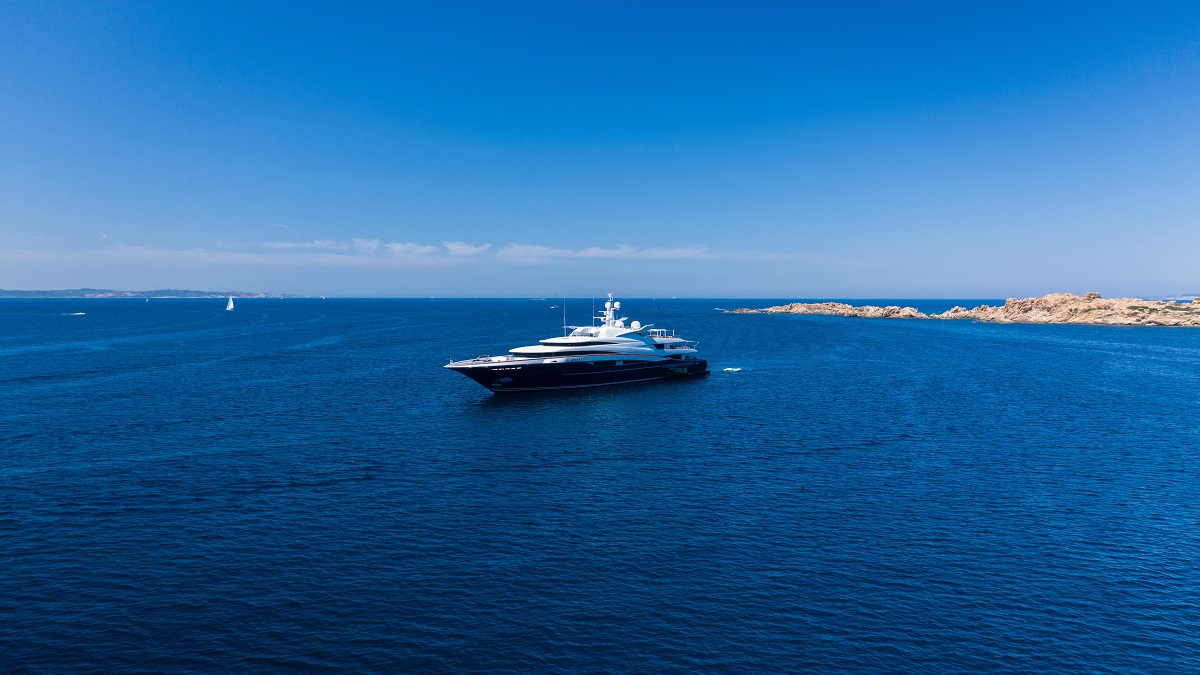
A sailing vessel’s indemnification liability coverage is provided through yacht insurance, and it covers any damage to the yacht’s body, property destruction of others, and private property damage aboard the vessel. This insurance may also cover gas supply, towing, and help if your boat gets stuck, depending on the insurance company.
Understanding The Two Parts of Yacht Insurance
Hull insurance.
Hull insurance is a direct and all-risk insurance policy that covers damage and includes an agreed amount of hull insurance. The amount settlement is done when the policy is drawn up, and the payment is in full in the event of a total loss. In addition, there’s the possibility of replacement costs insurance for partial losses. Still, sails, batteries, canvas outboards, and sometimes outdrives aren’t covered and are instead at risk of depreciation.
Indemnity and protection (P&I)
Protection and indemnity (P&I) insurance provides the most comprehensive insurance coverages for liability. Because maritime law is unique, you must have coverages specifically designed to protect you from risk-taking situations. P&I will cover any judgments against you and pay to defend you in admiralty courts.
What are the factors that can influence your yacht insurance?
Insurers consider many factors when deciding whether to offer a policy.
Almost any vessel can be insured – for a price. You should consider the following to make sure the policy you buy meets your needs:
- Age of the vessel
- Value (make sure you consider depreciation over the years of the value of your yacht)
- Speed/Power
- Type of vessel (Sailing, motor, Inboard, Outboard, utility, cruiser, offshore fishing boat)
- Custom built (boats without serial numbers can be tricky to insure)
- Location of use (which ocean are you planning to locate your boat. Make sure you let your insurance know whenever this changes over the months!)
What does yacht insurance usually cover?
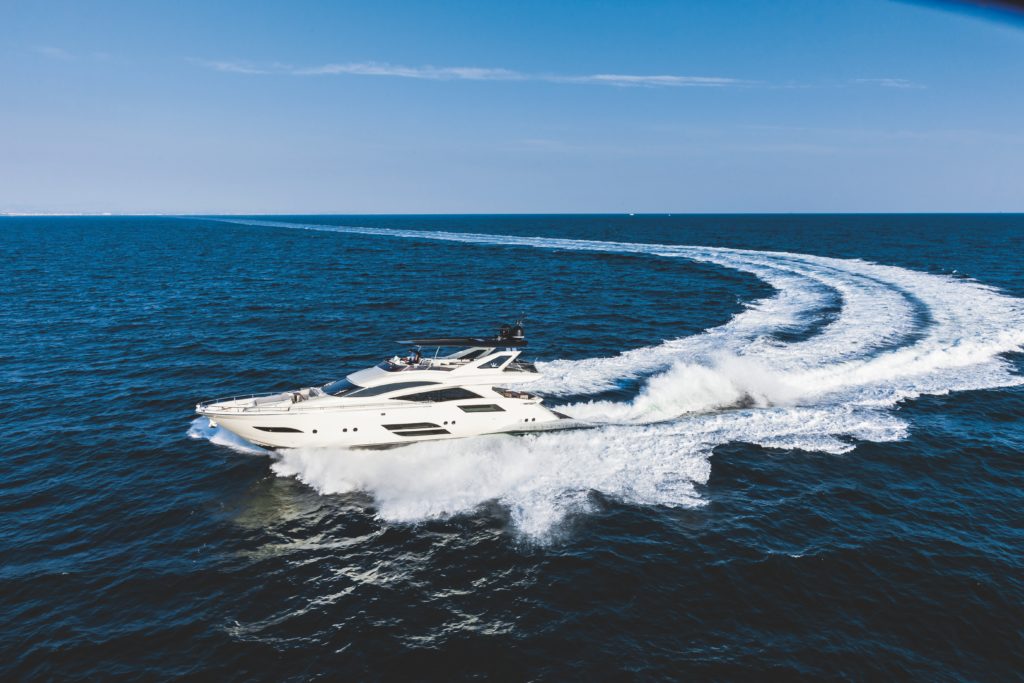
Usually, the yacht insurance covers:
Liability protection: the bare minimum insurance
Property damage liability pays for damage to another person’s property caused by the accident you commit. You are covered if your yacht causes damage to individuals or damages other ships, docks, or buildings. Remember that harm or damage might occur due to direct contact with your boat or events induced by your yacht, such as during heavy wakes. In most cases, boat liability insurance covers you against covered claims and litigation involving settlements and legal expenses. To ensure that you have the right coverage, talk to your advisor regarding your needs and potential dangers.
Hull and machinery coverage
Hull insurance will cover any physical injury to your boat, including motors, trailers and equipment, and even accessories in many instances. Damage from wind and fire are typical claim types.
Uninsured boater coverage
Indemnifies bodily injured passengers of the insured watercraft who suffer injuries due to the uninsured owner of a different vessel.
Search and rescue
The maximum amount is $10,000 for costs that an insured incurs to a government entity like the United States Coast Guard (USCG), which provides emergency assistance and is covered at absolutely no cost.
Marine environmental damage and pollution coverage
This protection is available up to $10,000 in penalties and fines in the event of marine environmental damage as per the policy’s conditions. This coverage is added to the insurance company’s liability and OPA limit.
Agreed value coverage or actual cash value coverage
A cash value policy offers lower coverage than an agreed value insurance policy, however, generally with a lower cost. ACV policies provide coverage up to the value of the vessel. ACV policy would protect up to the price of the market for the boat if there was a complete loss, including depreciation and conditions of the vessel when it suffered the loss.
Crew medical and personal coverage
Reasonable medical and related costs are covered for all onboard passengers leaving or boarding the vessel. These benefits are granted per person instead of per event.
If your vessel gets damaged by accident, collision insurance is an optional insurance policy that covers the cost of fixing and replacing the damaged part with less deductible.
Sinking and wreck removal
Insurance for boats generally can cover sinking. However, there are some critical policy limitations. In general, insurance for boats should protect your boat if it sinks due to any covered risk. The policy could reimburse you for the cost of salvage or removal.
What is usually excluded from yacht insurance policies or comes as an extra?

War coverage
Damages caused by acts of war can turn out to be too great to insure, making the repayment too astronomical to be true.
Hurricane insurance
Your boat insurance provider may be able to pay for damages to your vessel caused by wind and hail from a storm in the event of a hurricane unless stated explicitly in the policy. Contact your boat insurance provider to find out what coverage you have during a storm.
Marine life encounters
Most insurance for boats doesn’t provide coverage for marine-related damage such as sharks, whales, and many other species. If you frequently sail in water full of marine creatures, it is possible to discuss a supplemental insurance policy with your insurance provider.
Insects and mold
The majority of yacht insurance policies do not cover insects and mold. It is essential to take the necessary steps to safeguard yourself against any pests on your vessel. So, this means that you must wash, drain, and dry your boat’s equipment after use.
Toys and PWC onboard
The PWC onboard may need to have a separate insurance policy as it is an expensive purchase.
Negligence or criminal acts
No insurance company is accountable for paying for the illegal actions of other people. Damage or loss due to reckless negligence and incompetence is also not acceptable.
Most insurance coverage for boats won’t cover certain events, such as racing on a yacht. Suppose you plan to use your boat to compete. In that case, you might want to consult your insurance representative about supplemental insurance, precisely the possibility of additional liability insurance if there’s a crash in the course.
Kidnapping and ransom
Because of the high stakes involved – human life and assets such as vessels and cargo — as well as the criminal character and challenging legal context, resolving a hijacking or abduction for ransom is a difficult task. Hence, kidnapping and ransom are not included in yacht insurance.
What do you need to know before picking a yacht insurance policy?
When evaluating physical damage cover, the most significant question is whether the insurance is focused on “agreed value” or “actual cash value” damage payout. If there is a complete loss, most agreed value coverage covers the amount shown on the insurance contract. After depreciation, you will receive compensation.
The actual cash value coverage offers protection up to the vessel’s present market worth at the moment of complete loss, after depreciation and the deductibles.
Although the coverage is smaller in an actual cash value insurance than in agreed value insurance, the policy is generally inexpensive.
The next thing you want to consider while choosing your insurance is the deductible and premium.
The amount you self-insure in the case of a loss is your yacht insurance deductibles. Put another way, it is the amount you spend on claims before your insurance comes in.
The next is premium. Choose insurance that can fit your budget to pay your premium on time without fail.
Another thing to consider is the Intended cruising area. Some policies put restrictions or have a defined area while cruising. So, choose an insurance policy that suits your cruising area so that in case of mishaps, you can get coverage.
Yacht Insurance Requirements

Is yacht insurance mandatory?
While it’s not usually a legal necessity, it is always a good idea. It’s unlikely to cost much, but it might save you a lot of money in a disaster. Even if you or your captain are the finest sailor on the planet, you must consider what would happen if someone else collides with your yacht.
Changing weather may damage your boat, yet you usually have little control over it. Fortunately, most yacht insurance policies aren’t too costly, and the modest additional cost may provide comfort while cruising on the sea.
Does the bank require insurance while you finance the yacht?
Yes, your bank may require proof of yacht insurance if you want to finance the yacht.
Do ports and marinas need your yacht insurance?
For utilizing their facilities, numerous ports and marinas will need you to have boat insurance.
Does renting the yacht require insurance?
If you intend to rent out your yacht, you must have coverage to safeguard your asset, and yacht insurance can be highly beneficial. If you want to rent your yacht, you must get boat insurance to protect yourself from liability hazards, and the insurance covers the majority of liability concerns.
Read also : The yacht charter experience ladder
How much does a yacht insurance cost?
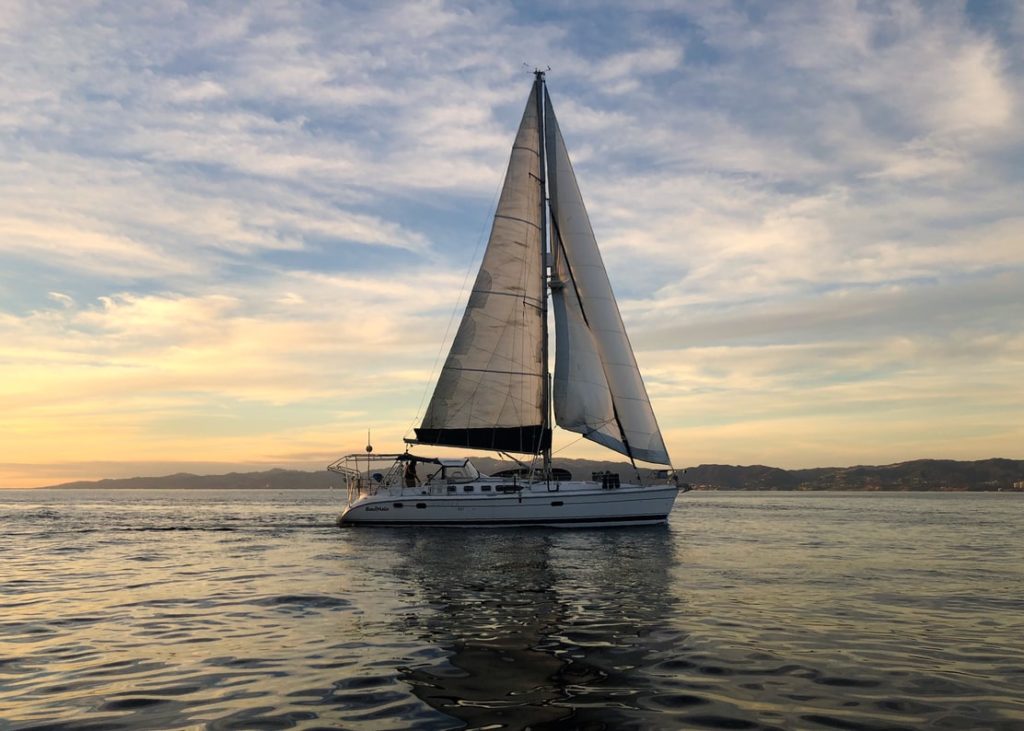
Usually, yacht insurance costs between 1% and 5% percent of the yacht’s value. For instance, you may spend around $2,500 annually to insure a boat worth $100,000.
However, similar to other types of insurance, the cost of your boat insurance depends on you and your vessel. The higher the value of a boat, the greater the insurance cost. Yacht insurance is often costlier than floating insurance since yachts are more expensive. High-powered boats are riskier. Thus, insurance companies consider the kind of engine (inboard or outboard, amount of horsepower, and so on).
How can I lower my yacht insurance cost?

Here are a few steps that you can take to lower your insurance cost.
Limit the cruising area of your yacht
There are navigational restrictions in marine rules, meaning you may only sail inside a specified region. The premiums will be less the smaller and securer the area is.
Have good training and driving records
Insurance companies are interested in your expertise on the water. The completion of a boating course demonstrates proficiency, which reduces your risk. Most insurance companies would consider boating lessons, but they may even provide a rate reduction. Contact your agent to determine whether safety-related boating classes impact your premium rates.
Lower the liability limits
Most insurance companies will require your credit score to establish suitable premiums. Maintaining a good credit score has several advantages, including cheaper insurance prices. To lower your liability limits, consider working on your credit score.
Pick a higher deductible to reduce the premium of your insurance
A greater deductible implies that the policyholder will be responsible for a percentage of the claim, hence decreasing the occurrence of claims. You choose to pay a part of the claim by raising your deductibles out of your cash, and the company will eagerly reduce your premium.
Choose seasonal insurance during the offseason
Fire, theft, vandalism, and winter storms can all cause significant damage and financial burden. You won’t be insured for any winter tragedy that strikes your yacht during the off-season if you don’t have insurance. You’ll be responsible for possibly astronomical expenditures.
Pick a modern boat rather than an old one
A new yacht will cost less to insure than an older one. This is because older ones are susceptible to acquiring defects, while newer ones are not. Further, you can take several steps to improve your yacht’s safety, contributing to lowering your cost. Like, installing an autonomous fire control system may decrease the danger of fire damage and make you eligible for a premium reduction. Additionally, safety devices like radar, depth finders, first aid kits, GPS, emergency kits, and EPIRBs may reduce the danger.
Our advice to find the best insurance broker at the best cost for a yacht

Avoid using your home and car insurer for yachts above 27”.
Usually, boat insurance is meant for vessels less than 26 feet long. Yachts are generally longer than 27 feet, have far more powerful engines, and cost more than smaller vessels.
Yachts typically go greater distances and deeper seas, transport more passengers, need a crew and have several equipment and personal possessions. These variables result in distinct risk exposures and need particular insurance policies, coverage choices, and deductibles.
Maritime law governs rather than state or federal law in deeper seas, which may be more complex. If your boat has a crew, you might be obliged to have Harbor workers and Longshoreman’s covers.
Partnering with an advisor who knows the worth of your boat and how you intend to use your boat can assist you in getting the necessary coverage for any potential catastrophes. You will also need specific insurance coverage if you own a high-performance boat due to the increased risk.
Pick a trustable company with expertise in marine insurance
You can choose your regular insurance provider to get your marine insurance. There are several maritime governing rules when you decide to sail on the sea or plan to sail overseas. Additionally, it is essential to engage with a provider that has a deep understanding of boat and yacht coverage. This is vital at the time of insurance application and in the severe case of a claim.
Special needs might require custom policies
If you have any special needs, additional coverage choices are available for medical costs, private possessions, the boat’s transportation equipment, and more that may be added to any plan. However, that relies on the type of insurance provider you choose.
Optional coverage extensions:
- Trip disruption
- Private property
- Trailer Coverage
- Towing and Emergency Roadside Service
- Uninsured Watercraft
- Individual Liability
Get an experienced yacht broker to help you navigate policies.
You may have 100 policies in front of you and many lucrative offers claiming several things. Yet, making the right insurance takes time and a better understanding of all the coverage. So, an experienced broker can help you navigate all these policies and select one that fits your budget and particular situation.
The best companies for yacht insurance
Many insurance firms provide boat insurance at affordable prices. Shop around to ensure that you receive the necessary information to make an educated selection. Also, there are several websites that offer evaluations of various insurance providers and are excellent starting points for your study.
Communicate with other sailors; determine which aspects they value and why. You would be in a position to make the most excellent option for your requirements when you analyze the services of various companies.
Being on the ocean is a feeling of serenity, tranquility, and impending new experiences. So, this is an encounter you want to go on forever. Further, your sailing boat is a significant investment. Hence, consider having your luxury boat insured to cherish the best of life and keep your investment safe.
Don’t take chances with your yacht, act now and ensure a safe and worry-free sailing experience
Now that you understand the importance of yacht insurance, don’t wait any longer to protect your valuable asset. Contact us today to get a quote and secure peace of mind on the water. Our team of experts will guide you through the process and help you choose the best coverage for your needs.

Frequently Asked Questions
All ship and yacht owners are obliged to have marine insurance, mainly when the vessels will be utilized for commercial or transit reasons and move people, labor, or goods overseas.
our yacht insurance usually protects your yacht against frequent dangers such as drowning, storm, fire, collisions, and theft. You may also be protected by boat insurance if you accidentally harm somebody or destroy their property. Your coverage may cover the following boat components: machinery, attached equipment, hull.
The exclusions from yacht insurance policies include: criminal actions of others, insect infestations, lack of due diligence on the part of the assured or managers, common wear and tear, loss resulting from delay, and intentional wrongdoing by the captain or crew.
The typical cost of boat coverage is between $200 and $500 per year. However, insurance may cost between 1 and 5 percent of the boat’s worth for a yacht or sailboat. For instance, you may spend around $2,500 annually to insure a boat worth $100,000.
Sailboat owners often spend between $250 and $1,500 annually to protect their yachts. This price varies depending on various criteria, including insurance type and insurance amounts, and sailboats usually are less costly to cover than powerboats.
Annual insurance on the yacht will range at roughly 1.5 percent of the boat’s value. The cost to insure a catamaran depends on hull valuation, location, and the boat’s operation.
The insurance coverage of a mega yacht or a super yacht can be around $240,000.
To reduce the cost of yacht insurance, you can take the following steps: installing safety equipment, demonstrating better boat riding skills by undertaking a boating course, considering your deductibles, limiting your sailing area or working on credit scores.
Hull relates to the vessel’s body. The insurance will cover unexpected damage or loss to the boat anywhere inside the policy’s specified maritime boundaries.
Usually, classic boat insurance is provided by specialized insurance firms who specialize or have experience in protecting classic and antique vessels. For covering your old boat, get a quotation from a specialized insurer and verify that your policy provides the protection you want for a sense of security.
Luxury Yacht Charters in Croatia : Our Guide
Mediterranean islands: our ultimate guide, you might also like.

What differentiates a yacht from a superyacht or a mega yacht?
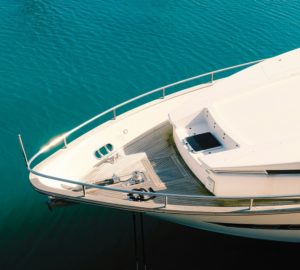
Chartering Requirements and Regulations: A Guide for Boat Owners

What are the Fastest Cruising Catamaran on the Market?
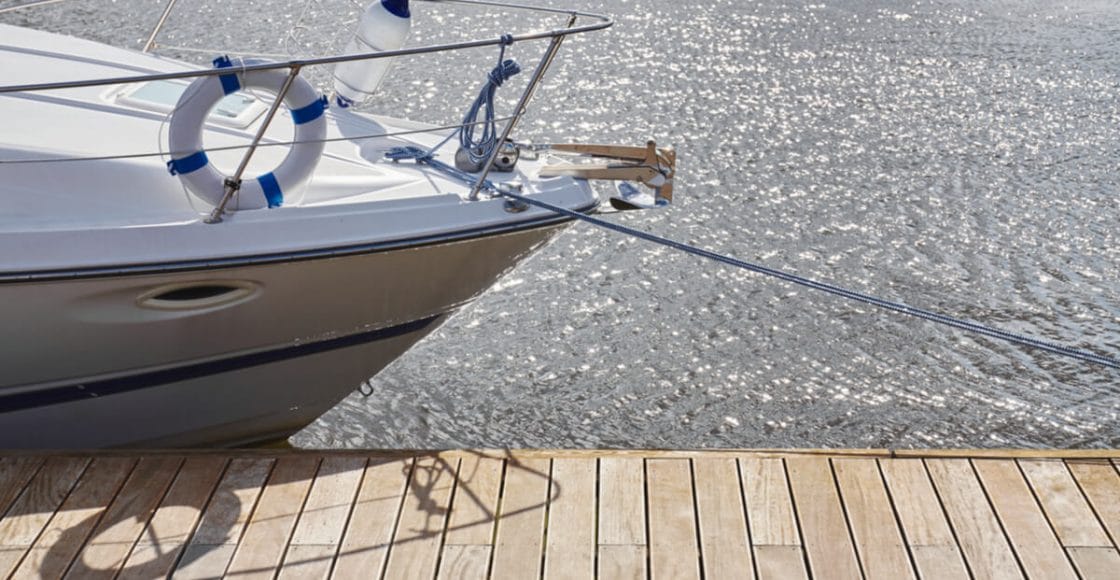
How Much Does Boat Insurance Cost?

Table of Contents
Last Updated on March 23, 2022 by Boatsetter Team
Nearly half of boats are uninsured primarily due to high premiums and deductibles, but boating without insurance is the same as driving without it—it’s very risky and in some states, it’s illegal. Let’s look at when you need insurance and how much its’ likely to cost.
Own a Boat? Learn How to Offset the Cost of Ownership by Listing on Boatsetter
Average Boat Insurance Costs: Per Month and Per Year
As a responsible owner, your boat should be insured from the minute you take ownership or control of it. Boat insurance costs vary and can run from $500 per year for smaller boats to thousands of dollars for large yachts.
A rule of thumb is that annual premiums will total 1 to 3 percent of the value of the vessel.
- For example, a $50,000 boat will have annual premiums of $500 – $3,000 and a policy for a $200,000 boat will cost $3,000-$6,000 per year. This doesn’t hold for very large yachts where the percentages as well as the absolute numbers rise dramatically.
- Big yachts will have additional equipment and possibly professional crew , or they may be chartered all of which adds to the overall coverage costs.
You can buy boat insurance online or get a quote from specialized agents like GEICO/BoatUS , who may also be able to provide a boat insurance calculator to get you started.

How Much Should I Insure My Boat For?
There are several factors that will dictate how much you should insure a boat for:
- Size, vessel type and value
New or pre-owned
- Where you will be boating
Size, type and value
Bigger and more expensive vessels will require higher insurance coverage limits and higher premiums. Also, high performance boats (like fast cars) command a premium because of the risks that go with the kind of boating they engage in.
New boats are easier to insure because presumably, there are fewer risks of equipment failure. However, the coverage for new boats may be more expensive simply due to the higher value of the vessel itself.
How much does it cost to insure a used boat? Well, that depends. An insurance company may require a current survey to make certain that the boat is in a seaworthy condition. Surveys cost money and the premiums for older boats may be higher or lower depending on the boat’s condition. Some insurers won’t cover boats older than 20 years.
Cruising grounds (where you’re be doing most of your boating)
Boat insurance costs will vary by state with some being much higher than others. If you boat in waters that are known for hurricanes , you may have to add coverage in certain seasons and geographies. If the boat will be stored ashore for an extended period, you may qualify for a discount.
Outside of insurance, be sure to read our guide outlining the costs of boat ownership and what expenses you can expect.
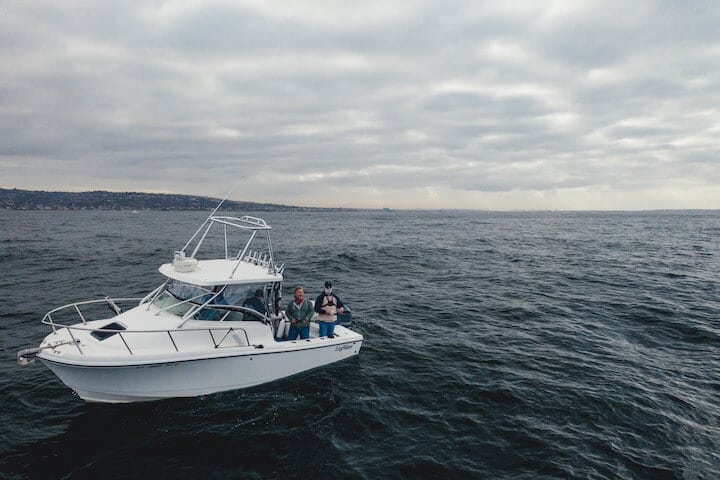
Why is Boat Insurance So Expensive?
There are risks that go with boating—collision, onboard damage, injury, environmental impact, etc. There are fewer experienced boaters on the water than there are drivers on the road so boat insurance costs can be steep.
How Can I Lower My Boat Insurance Costs?
Some insurers will offer a discount for having multiple policies with the company, for having a good driving record, for paying a year’s worth of premiums up front, or for the owner/operator completing boating safety courses. You can also opt to lower monthly premiums by raising the deductible.
Commercial Boat Insurance, Peer-to-Peer, & Charters
Insurance costs rise when the boat is chartered or used for commercial purposes, because it’s expected that it will be used more frequently and will carry paying passengers.
This extends to peer-to-peer boat rentals, like Boatsetter rentals, where private owners lease their boats with or without a captain. If decide to become a Boatsetter owner and list your boat for rent, you’ll have peace-of-mind through coverage provided by the company’s exclusive peer-to-peer boat rental policy provided through GEICO/BoatUS .
So, is Getting Boat Insurance Worth It?
Absolutely. Accidents happen so whether there are medical costs, expensive property damage, legal fees or the cleanup of an oil/fuel spill, you’ll want the boat you rent or buy to be covered.
Earn an Average of $20,000 or More by Listing Your Boat for Rent on Boatsetter

Zuzana Prochazka is an award-winning freelance journalist and photographer with regular contributions to more than a dozen sailing and powerboating magazines and online publications including Southern Boating, SEA, Latitudes & Attitudes and SAIL. She is SAIL magazines Charter Editor and the Executive Director of Boating Writers International. Zuzana serves as judge for SAIL’s Best Boats awards and for Europe’s Best of Boats in Berlin.
A USCG 100 Ton Master, Zuzana founded and manages a flotilla charter organization called Zescapes that takes guests adventure sailing at destinations worldwide.
Zuzana has lived in Europe, Africa and the United States and has traveled extensively in South America, the islands of the South Pacific and Mexico.
Browse by experience

Explore articles

5 Best Ocean Boats
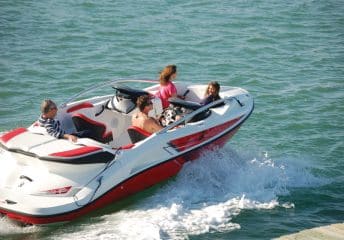
Small Boats: What Type is Right for You?

Lady Bird Lake Fishing Guide
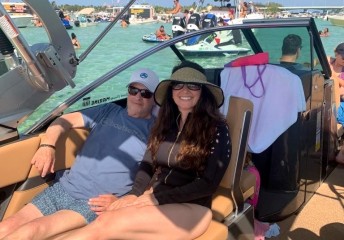
How Summer Days With my Father on Fox Lake Led to Founding Boatsetter
- Buying and Selling Boats
- What Should You Expect To Pay For Boat Insurance?
What Should You Expect to Pay for Boat Insurance?

In some areas, boat insurance is mandatory. In other areas, it's not required, but it's still a good investment. If you're shopping for a boat, you should also be shopping for boat insurance. But what exactly should you look for in a boat insurance policy? And how much can you expect to pay for a typical premium?
The Average Cost of Boat Insurance
Let's start by looking at the average cost of boat insurance, applied broadly.
Progressive calculated average boat insurance premiums in the United States using data from 2020 and 2021 – which is still fairly accurate for getting an initial estimate.
Overall, you can expect your boat insurance premiums to amount to between $245 and $652 every year, which equates to about $20 to $54 every month.
If you live in a high-cost state, you can expect an annual premium of $527, or $44 a month. Alabama, Alaska, Connecticut, Delaware, Florida, Hawaii, Louisiana, Maryland, Massachusetts, Mississippi, Nevada, New Jersey, New York, South Carolina, Rhode Island, and Texas.
If you live in a medium cost state, you can expect an annual premium of $344, or $29 a month. These states include Arizona, California, Georgia, Idaho, Kentucky, Maine, Michigan, New Mexico, North Carolina, North Dakota, Oklahoma, Oregon, Tennessee, Virginia, Washington, West Virginia, and Wyoming.
If you live in a low-cost state, you can expect an annual premium of $263, or $23 a month. These states include Arkansas, Colorado, Illinois, Indiana, Iowa, Kansas, Minnesota, Missouri, Montana, Nebraska, New Hampshire, Ohio, Pennsylvania, South Dakota, Utah, Vermont, and Wisconsin.
What accounts for the differences here?
Obviously, cost of living plays a bit of a role here, but you've also likely noticed something similar about the states that are grouped together. States that are closer to accessible water, and those with more aquatic options, tend to be more expensive, for understandable reasons.
In Europe, you may have to consult some conversion tables, but the rates are somewhat similar. The average annual premium of comprehensive boat insurance for a yacht in the UK, for example, is £380 , putting it somewhere between a medium cost and high cost U.S. state.
Variables That Influence Your Boat Insurance Costs
There are many different variables that are going to influence your boat insurance costs. The estimates in the preceding section can help you get a baseline for the premiums you can expect, but only by factoring in these variables will you be able to get a more accurate estimate.
- Location. Where you live matters. Some areas are home to highly popular, densely packed oceans, lakes, and rivers, where you can take your boat out frequently at a moment's notice. But if you live 100 miles away from the nearest body of water, and you're only going to take your boat out 2 or 3 times a year, you're going to pay much less for your insurance.
- The nature of your boat. The manufacturer and type of boat that you have is also going to influence your insurance costs. As you might imagine, bigger boats are more expensive to insure. More expensive boats are also more expensive to insure. And if your type of boat is associated with more accidents than other types of boats, you can expect your premiums to increase.
- Boat age. Insurance companies will also consider the age of your boat. The older the boat, the riskier the asset becomes, and the more expensive it becomes to insure.
- Boat horsepower. Boat horsepower can also influence the cost of your premiums. The faster and more powerful the boat is, the more damage it can do if it's ever involved in an accident. Fast boats are often highly correlated with accidents in general, since the people driving them may be looking for a thrill and may be more tempted to engage in risky activity.
- Personal boating history. Of course, that can be mitigated by your personal boating history. If you've owned and operated boats for 25 years, and you've never had to make an insurance claim, your premiums are going to be less expensive than someone who's completely new to boating, but they've already been in three boat accidents.
- Driving record. Many insurance companies will also take your driving record into account, as an indicator of your level of safety and responsibility. If you have a long history of automobile accidents, you can expect your boat insurance premiums to be higher.
- Safety equipment present. You can get a discount on your insurance policy, in many cases, simply by having more safety equipment onboard. Your insurance agent will ask you lots of questions about your safety equipment and safety precautions – just be sure to answer honestly.
- Other risk factors. Insurance underwriters often look at other risk factors as well, hoping to accurately estimate your risk of being in an accident. The higher the risk, the higher the premium.
What Should Your Boat Insurance Policy Include?
The two main types of boat insurance are agreed value and actual cash value policies. Agreed value policies are based on the value of the boat whenever the policy was written; it doesn’t factor depreciation into the equation, but you’ll typically pay more upfront. Actual cash policies are based on the current value of your boat, even as it declines through depreciation.
Many boaters choose an “all risk” policy, which covers many – but not all – types of losses. In this type of policy, the policy will cover anything that’s not explicitly omitted. Frequent omissions here include things like marring, denting, ordinary wear and tear, damage from animals, manufacturer defects, and ice damage.
You can also choose additional coverage for things like medical payments, coverage for uninsured boaters, liability coverage, and coverage for towing and assistance.
No matter what, it’s important to read your policy carefully to make sure you understand what it covers and what it doesn’t.
Thankfully, most boat insurance policies are relatively inexpensive. Even at the upper end of the spectrum, with annual premiums exceeding $500, the fact that a robust policy can save you tens of thousands of dollars or more makes it more than worth it. If you’re looking for your next boat to insure, check out our vast selection of new and used boats for sale today !
Share this article
You might like.

Sign up to our newsletter
By submitting this form, you agree to our Privacy & Cookie Policy
Change units of measure
This feature requires cookies to be enabled on your browser.
Show price in:
Show lengths, beam and draft in:
Show displacement or weight in:
Show capacity or volume in:
Show speed in:
Show distance in:

When you use links on our website, we may earn a fee.
Best Boat Insurance of 2024

Boat insurance is a type of coverage designed to protect boat owners and their personal property in the event of an incident on the water. The best boat insurance companies offer flexible coverage options for a variety of vessels, with reasonable premiums and lots of additional benefits.
Every person who owns or operates a boat should consider carrying boat insurance , as it protects them against personal liability if they’re in an accident, as well as guarding them against loss if something happens to their vessel. In this guide, we’ll explore some of the best companies that offer boat insurance, what they offer, as well as their benefits and drawbacks. We’ll also discuss special coverage options for particular use cases or types of boats.
Table of Contents
- Best Boat Insurance
- How to Find
- How to Save
Geico Marine »

Insures boats up to 50 feet in length
Gives policyholders access to BoatUS Catastrophe Team
Insures boats valued up to $2.5 million
Doesn’t insure wood or composite boats
Boats more than 40 years old aren’t eligible for coverage
Geico Marine has been writing boat insurance since the 1980s. Originally established as Seaworthy Insurance, the company was bought by financial giant Berkshire Hathaway in 2007.
Under the Geico umbrella, Geico Marine offers insurance designed to meet the needs of the vast majority of boat owners. The list of boats that are ineligible for coverage by Geico is far shorter than those that are. Disqualifying criteria include:
- Boats over 50 feet in length
- Boats over 40 years old (15 years for houseboats)
- Multihull sailboats (catamarans)
- Watercraft made of wood or composite material
- Homemade boats
- Amphibious land boats or hovercraft
- Boats previously deemed a total loss
- Boats valued over $2,500,000
In addition to its strong lineup of coverages, Geico Marine insurance also comes with 24/7 assistance. Additionally, the company has a long-standing association with The Boat Owners Association of the U.S. (BoatUS), including giving policyholders access to the BoatUS Catastrophe (CAT) Team. The BoatUS CAT Team is a group that brings considerable resources to bear – including towboats and cranes – to help BoatUS members and Geico customers recover and salvage their vessels after a natural disaster.
Coverages Offered: |

Special coverage for rods, reels, and other equipment
Emergency towing and personal property coverage included
Lift and trailer coverage available
Claims can take a few weeks to settle
Some negative customer reviews online
Specialty insurer Markel is another provider of boat insurance. Markel boat insurance policies come with multiple coverages included and even more optional coverages available, including many not available from other insurers. Several of these special coverages are geared towards fishing enthusiasts, including both amateurs and professionals.
Among Markel’s special coverages for fishers are protections for rods, reels, and other personal effects, plus coverage for boat lifts and trailers. The company even offers professional angler liability coverage and tournament fee reimbursement as optional add-ons.
However, according to Markel’s documentation and customer reviews online, the company can take up to several weeks to settle claims. This is somewhat longer than some other providers. Customers have also noted that claims can take longer and be more involved, increasing the time it takes to get boats repaired or replaced.

Coverage designed specifically for yacht owners
High coverage limits available for captained vessels
Vessels must be 36 feet longer or greater to qualify for yacht coverage
Crew required for vessels over $3 million
Global insurer Chubb is one of the few large carriers that offers boat insurance designed specially for yachts, including those over 70 feet in length with professional captains and crews.
Yacht insurance from Chubb is available for pleasure cruisers at least 36 feet long (and valued up to $3 million), as well as captained yachts at least 70 feet long and valued at $3 million or more.
Among the niche yacht coverages available from Chubb are:
- Search and rescue
- Longshore and harbor workers’ compensation
- Boat show and demonstration
- Oil Pollution Act
Yacht insurance from Chubb can even include temporary substitute watercraft, so you can still enjoy the water if your yacht is damaged and requires repairs.

Coverage specifically designed for personal watercraft
Vessels are still covered during winter lay-up periods
Water sports liability coverage is included
No coverage for commercial use
$25,000 limit for no-fault medical payments
Specialty provider SkiSafe is one of the biggest personal watercraft insurers you’ve never heard of. The company doesn’t underwrite its own policies; that’s handled by AXIS Insurance Co., a large Bermuda-based insurer. SkiSafe has been around for nearly 50 years and insured more than half a million boaters.
Boat insurance from SkiSafe is designed to meet the needs of personal watercraft owners. As a result, coverages are fairly consolidated and focus specifically on the reduced needs of these types of boaters. Naturally, there is a heavy focus on coverage for injuries, including related to water sports. However, there are also special savings related to lay-ups, since the season for personal watercraft can be relatively short compared to other types of boats.
American Family »

Special coverage designed specifically for houseboats
Up to $100,000 of personal effects coverage available
Boats up to 54 feet can be covered (40 feet in Georgia)
A marine survey may be required
Must work with a local agent to buy coverage
American Family is unique among boat insurance carriers in that it’s one of few that offers a policy designed specifically for houseboats. Included in American Family houseboat policies are several coverages that cater specifically to these types of vessels, including up to $100,000 for your personal property in case items are stolen, damaged, or fall into the water.
Houseboat insurance from American Family may lack some coverages you might find with other types of vessels, such as emergency towing or parts delivery (these are included in some boat policies from American Family, but it’s unclear from the website whether they’re included in houseboat policies). Additionally, these policies have restrictions specific to houseboats, including horsepower limitations. But, American Family also offers unique discounts particularly helpful for houseboat owners.
Progressive »
Numerous discounts available
Can buy coverage online
Up to $1,000 of coverage if a pet is hurt or killed in a boating incident
Lots of limits on boat length and value
Many types of vessels are ineligible for coverage
Rounding out our list is insurance giant Progressive, which also has a strong boat insurance offering. Progressive has been insuring boats for more than three decades and insures more than 1 million vessels. Its policies should meet the needs of most owners of boats less than 50 feet long and worth less than $500,000.
Where Progressive really shines, though, is in its list of available discounts. Progressive offers boaters not just the standard discount opportunities available with other insurers, such as multi-policy, multi-boat, or paid-in-full discounts. Progressive also offers savings simply from switching coverage from another country. Additionally, accident forgiveness is also available for incidents both large and small.
The Bottom Line
Boat insurance is a highly individual product, much more so than auto or home insurance. Because boat owners’ needs vary greatly, it’s important to research providers to find the right carrier for your vessel and use case. Based on our research, we found that Geico is the best insurance company available for the widest array of vessels and the most common types of uses.
How to Find the Best Boat Insurance
Here are some essential tips to keep in mind when looking for the best boat insurance policy:
- Evaluate your coverage needs. Based on your boat's value, usage, and legal requirements, determine the type and level of coverage required.
- Compare quotes. Obtain quotes from multiple insurers to compare premiums, coverage options, and discounts.
- Review policy details. Carefully examine the policy's coverage limits, deductibles, exclusions, and additional benefits.
How to Save on Boat Insurance
When seeking to lower the cost of your boat insurance, consider:
- Maintaining a clean driving record. Even though you will be driving a boat and not a car, your record on the road can still be taken into account since many insurers link good driving with good boating.
- Improving your credit score. Maintaining a good credit score can also lower your premiums.
- Searching for discounts. Inquire about discounts, such as those for taking a boating course, being an experienced boater, or having outboard propulsion.
- Bundling policies. Save money by bundling your boat insurance with home or auto insurance policies.
- Raising deductibles. Opting for a higher deductible can lower your premiums, but ensure you can cover the out-of-pocket costs if you need to file a claim.
- Getting a marine survey. This will tell you how much your boat is worth, enabling you to get a more precise quote from your insurer.
- Making as few small claims as possible. Just like with other kinds of insurance, the more claims you make, the higher your premiums will be.
Do You Need Boat Insurance?
Whether you need boat insurance depends on various factors, including legal requirements and your personal circumstances. You should consider:
- State requirements. Some states require boat insurance, especially for larger or more powerful vessels. Check your state's regulations to determine if insurance is mandatory for your boat.
- Marina requirements. Many marinas require proof of insurance to dock your boat. This ensures you have coverage for potential damage to the marina or other boats.
- Protection. Boat insurance can cover a range of risks, including damage to your boat, liability for damages to a third party’s items, third party injuries, theft, and medical payments.
How We Chose the Best Boat Insurance
To identify the best boat insurance, we reviewed offerings available from numerous reputable carriers. We focused primarily on those with solid financial ratings and comprehensive coverage options to meet the needs of a wide array of boaters. We then narrowed down our selections to those providers with best-in-class offerings specifically designed to meet certain types of boaters.
WHY SHOULD YOU TRUST US?
At U.S. News 360 Reviews, our contributors and editors have years of experience researching and reviewing complex financial topics including insurance policies. Dock David Treece , the author of this piece and a senior contributor for 360 Reviews, has more than two decades of experience in the finance and insurance industry. He has covered insurance and other financial topics for Forbes, Investopedia, Business.com, and other publishers. He has also written for several insurers, including Progressive.
Boat insurance is not required in most states. However, if you have a loan secured by a boat, most lenders require that you buy boat insurance. Additionally, boat insurance can protect owners and operators against personal liability if they’re involved in an accident.
When you buy boat insurance, you’ll need to provide several pieces of personal information, as well as information about your boat and applicable licenses. Depending on the type of boat and policy, you may also be required to submit a marine survey, which assesses the condition of your vessel.
Boat insurance does not typically have a waiting period before you can file a claim.
Some insurers allow policyholders to insure multiple boats under the same policy, so long as they all have the same owner(s). Many carriers also offer discounts for owners who insure multiple boats with the same company.
Depending on the size, type, and value of the vessel being insured, some carriers require a boat to undergo an inspection (called a marine survey) in order to assess the boat’s condition prior to binding coverage.
The amount of boat insurance you need depends on your boat's value and how you plan to use it. It should cover your boat's replacement cost, and you should also consider purchasing liability coverage for accidents, medical payment coverage for injuries, and coverage for theft of personal belongings.
Homeowners insurance might offer limited coverage for small boats under certain circumstances, like damage caused by fire or theft while on your property. However, larger or high-performance boats typically require separate boat insurance for comprehensive coverage.
About Our Team

Dock Treece
Contributor

Stephen Yao , Ph.D.
Insurance Reviewer
U.S. News 360 Reviews takes an unbiased approach to our recommendations. When you use our links to buy products, we may earn a commission but that in no way affects our editorial independence.
- Agent Directory
- Company Directory
Find an Independent Agent
- Get Matched with an Agent
- Agent Directory by State
Find an Insurance Company
- Get Matched with a Company
- Company Directory by State
What type of insurance do you need?
- Business Insurance
- Home, Auto & Personal Insurance
- Life & Annuities
By Coverage Type
- Commercial Auto Insurance
- Professional Liability Insurance
- Small Business Insurance
- Business Umbrella Insurance
- Workers' Compensation Insurance
- Commercial Property Insurance
- Business Owners Policy
- Builders Risk Insurance
- Cyber Liability Insurance
- Surety Business Bonds
- Inland Marine Insurance
- Employers Liability Insurance
- Employment Practices Liability Insurance
- Environmental Liability Insurance
- Errors and Omissions Insurance
- Insurance Coverage & Advice by State
- See more ...
By Business Type
- Retail Store
- Agriculture & Forestry
- Construction
- Manufacturing
- Wholesale Trade
- Retail Trade
- Transportation & Warehousing
- Information Industry
- Finance & Insurance
- Real Estate
- Scientific & Technical Services
Auto & Vehicle Insurance
- Car Insurance
- Motorcycle Insurance
- Boat Insurance
- RV / Motorhome Insurance
- ATV Insurance
- Snowmobile Insurance
- Personal Watercraft Insurance
- Collectible Auto Insurance
- Umbrella Insurance
Home & Property Insurance
- Homeowners Insurance
- Condo Insurance
- Farm Insurance
- Landlord Insurance
- Renters Insurance
- Mobile Home Insurance
- Contents Insurance
- Vacant Land Insurance
- Flood Insurance
Other Insurance
- Life Insurance
- Long Term Care Insurance
- Disability Insurance
- Health Insurance
- Special Event Insurance
- Short-term / Sharing Insurance
Insurance Solutions & Resources
- Compare Car Insurance
- Compare Home Insurance
We'll Help You Find the Best Boat Insurance in Minutes
Our nationwide network of local independent agents is ready to help you find the perfect coverage at the best rate..
TrustedChoice.com Article

How will this quote help me?
Your quote is based on several common factors to give you a clear picture of the cost you can expect, though an independent agent can shop around and maybe even improve your rate!
NOTE: This quote is not final, though we did work with professional actuaries to help get you a ballpark figure to get started.
Do you have to have boat insurance on a boat?
Only two states require boat insurance by law, but there are a few instances where you may need it. If you dock your boat at a marina, they may require some form of coverage in order to protect their business. Also, if you finance your boat, nearly every lender will require coverage to protect their investment; use our list of the best boat insurance companies as a starting point.
Other than that, you should always have at least liability coverage on your boat to protect yourself against lawsuit costs if you cause bodily injury or property damage to another party. Property coverage is optional, but again, the more comprehensive your coverage, the better it can protect you.
How much is boat insurance?
The cost of any boat insurance policy depends on a number of factors, including your boat's size, value, and horsepower. Boat insurance policies can range from the low hundreds to tens of thousands of dollars annually, depending on what kind of coverage you need.
Do I need to insure my boat trailer?
Insuring your boat trailer is always a safe bet. Though your boat trailer may be protected by your home or car insurance policy, you can also add coverage to your boat insurance for your trailer. It's best to talk to your independent insurance agent about your boat, the trailer, and how you use it to determine the right coverage amount.
Does boat insurance cover passengers?
If your policy includes medical payments coverage, it will cover injuries to your passengers if you get into an accident. Medical payments coverage is an important option because just one accident can cause injuries that are extremely costly to treat.
Does boat insurance cover theft?
Typically, yes. But it's important to review your specific boat insurance policy with your independent insurance agent to make sure. Every carrier and every policy is different, but the more you know about your own policy, the better it will help protect you.
Does boat insurance cover hurricanes?
In most cases, yes, your boat will be covered against hurricane damage. But, as with any other natural disaster or unexpected event, you'll want to double-check your policy.
Does boat insurance cover engine damage?
No, boat insurance often excludes defective machinery or maintenance costs. Wear and tear is a natural outcome of use and not covered by your policy.
What is the cost difference in insuring different kinds of boats?
The size and value of your boat are two of the most impactful features on the cost of your coverage. Insurance for a $20,000 boat can cost an average of only $300 per year, while insuring a $2 million yacht can cost as much as $30,000 per year.
Does boat insurance cover me if I hit a rock?
If you have collision coverage on your boat insurance, you should be covered for the cost of repairs if you hit a rock.
Does boat insurance cover a blown engine?
In certain cases, boat insurance may cover a blown engine if the disaster was due to a listed peril. For example, ice and freeze damage to engines is typically covered. However, blown engines due to the owner's negligence are not covered.

BOAT INSURANCE
Find the perfect agent to shop multiple insurance companies on your behalf, saving you time and money.
Boat owners can experience a lot of joy and excitement brought by their watercraft, but they also have to anticipate potentially costly disasters ahead of time. Aside from accidents on the water, your boat is also vulnerable to theft, vandalism, flood damage, and more. That's what makes having boat insurance so critical.
An independent insurance agent can help protect your vessel with the right boat insurance long before you ever need to file a claim. But first, here's some boat insurance 101.
What Is Boat Insurance?
Boat insurance is designed to cover boat owners and their watercraft in case of many different disasters, including accidents, fire, and more. These policies are made to protect boats that have motors, like yachts, pontoon boats, etc., but they don't cover kayaks or canoes. Boat insurance is important because homeowners insurance doesn't provide enough coverage on its own for most watercraft.
Do You Have to Have Insurance on a Boat?
Only two states actually require boat insurance coverage , but there are a few situations where you may need it. First, if you dock your boat at a marina, they may require some form of coverage in order to protect their business. Second, if you financed your boat, nearly every lender will require coverage to protect their investment.
Further, there are certain types of boats that are more important to insure than others due to their value, risk level, and more. Here's a handy guide to whether you need boat insurance for your vessel.
| Boats that need insurance: | Boats that don't need insurance: |
|---|---|
| Boats that have 25 horsepower or greater | Boats with less than 25 horsepower |
| Yachts | Small engine boats |
| Large sailboats | Small sailboats |
| WaveRunners | Canoes |
| Jet boats | Inexpensive boats |
Most often, boat insurance is purchased for:
- Utility boats
- Fishing boats
- Pontoon boats
Despite all the fun to be had with a boat, accidents and disasters can happen. The easiest way to protect yourself and others, and get you back on the lake after a situation, is with the right boat insurance.
Best Boat Insurance Companies
While many carriers offer boat insurance, it's helpful to know some of the top names in the industry before you start shopping. Here are a few of our highest-recommended boat insurance companies.
| Top Boat Insurance Companies | Star Rating |
|---|---|
An independent insurance agent can help you get the right boat insurance policy for you from one of these top-rated carriers, or another that best meets your needs.
Do I Need Boat Insurance?
The only two states that require boat insurance by law are Utah and Arkansas. Boat owners in these states must have coverage for personal watercraft or for powerboats with 50 horsepower or greater. Otherwise, if you live elsewhere and your boat is designated for personal use, you're not technically required to have insurance for it.
However, if you lease or otherwise finance your boat, you're likely to be required by your lender to carry boat insurance, and often you'll need both collision and comprehensive coverage. When docking your boat, you're often also required by the marina to have liability coverage. However, with boating accidents being so common, it's important to at least consider getting boat insurance for yourself.
Most Common Types of Boating Accidents
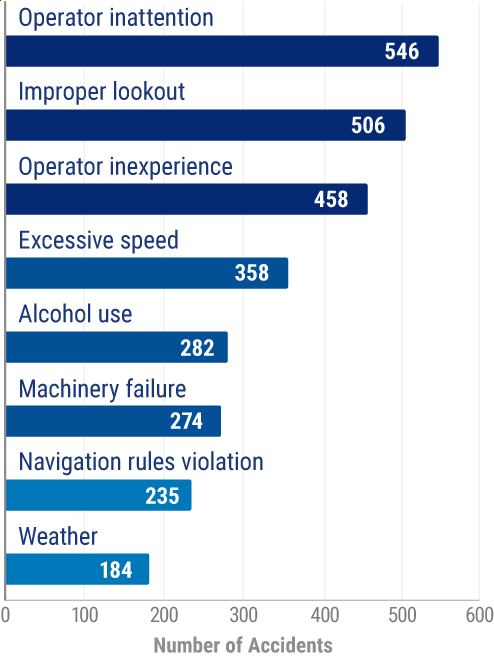
Notice that the top five causes of boating accidents are due to human error, such as inattention, improper lookout, alcohol use, and inexperience. Since you can't often blame the boat for an accident or other disaster, it's even more critical to ensure that your vessel is covered with the right insurance.
How Much Is Boat Insurance?
The average annual cost of boat insurance ranges from $200 to $500 depending on the type of boat you have and other factors. It also depends on which types of coverage you need, and how much coverage you need. For folks who only purchase liability coverage, you might pay less than $100 annually.
Often, you can expect the annual cost of your boat insurance to be about 1.5% of the value of your boat. For example:
- $20,000 boats cost about $300 annually to insure
- $50,000 boats cost about $750 annually to insure
- $100,000 boats cost about $1,500 annually to insure
- $500,000 boats cost about $7,500 annually to insure
- $2 million boats, like yachts, cost about $30,000 annually to insure
- If you are looking for boat insurance for older boats , costs will vary significantly
The cost of your boat insurance might not be this simple to figure out, though. For more help calculating the cost of your premiums, use our boat insurance calculator or reach out to an independent insurance agent for a quote.
What Factors Influence Boat Insurance Costs?
Like any form of coverage, boat insurance costs depend on several factors, including:
The make, model, and value of your boat
Your boat's make, model, and value influence the cost of boat insurance because the more expensive your boat is to replace or repair, the more expensive your coverage must be. If your boat is valued at less than $20,000, you will pay approximately the average cost in your state. If your boat is valued above $500,000, you might pay up to 2,250% of the average cost in your state.
Your boat's length
Boat insurance costs also depend on the length of your boat. Be prepared to pay about 66% more for your coverage if your boat is 100 feet or longer, but if your boat is less than 20 feet, you may pay 12% less than average rates in your state.
Your boating records
If you've had six or more accidents or violations within the past five years, you can expect a 90% increase in your boat insurance premiums. However, if you've had no incidents during this time, you can expect a 40% decrease in your boat insurance premiums.
Your location
Boat insurance premiums vary considerably by the state you live in. Many factors can influence insurance costs by location, including crime rates, property values, and more.
How you use your boat
Depending on the risk level of the activities you perform with or on your boat, your premiums may be higher or lower. Using a boat for towing can be riskier than using it just for fishing, so boats used for fishing would be likely to have lower boat insurance premiums.
How often you use your boat
Similar to auto insurance, how often you use your boat can also influence your boat insurance rates, because the more you use it, the more likely an accident or other disaster is to occur. For boats that only get taken out on occasion, premiums for boat insurance can be much lower than those that get used daily on the water.
An independent insurance agent can provide you with quotes for boat insurance from several carriers near you.
What Discounts on Boat Insurance Exist?
Many insurance companies offer several discounts on boat insurance to help lower the cost of your premiums. Here are just a few common boat insurance discounts:
- Boater safety course discount: You might qualify for a discount on boat insurance if you complete a state-approved boater safety course.
- Bundling discount: Many insurance companies offer discounts if you bundle your boat insurance with another policy through them, such as auto insurance or home insurance.
- Paid-in-full discount: Many insurance companies lower your overall premium if you pay for your entire year's worth of coverage up-front.
- Homeowners discount: Some insurance companies even offer discounts on your boat insurance just for being a homeowner, even if your coverage is not through the same carrier.
- Clean boating history discount: You're likely to be rewarded with a boat insurance discount by many carriers if you've maintained a clean, accident and violation-free boating record.
Your independent insurance agent is a great ally in helping you find any discounts you may qualify for on boat insurance, no matter which carrier you go through.
What Does Boat Insurance Cover?
Boat insurance provides a lot of important protection, not only for your boat, but also for you, your passengers, and everyone else on the water or at the marina. Boat insurance typically includes the following primary coverages:
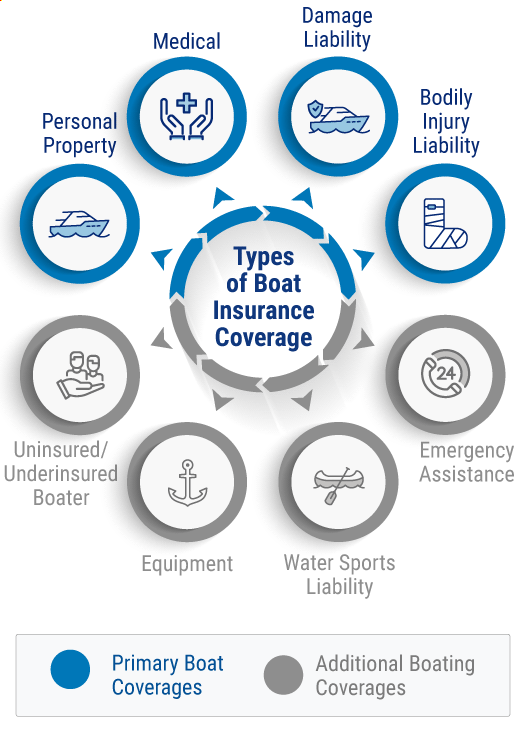
- Personal property damage: Provides reimbursement for your boat, trailer, and engine if they're damaged by a covered peril like vandalism, fire, etc.
- Medical payments: Provides reimbursement for treatment of injuries to you and your passengers who get hurt by your boat or while on your boat.
- Property damage liability: Provides reimbursement of property damage lawsuit costs from third parties due to your boat.
- Bodily injury liability: Provides reimbursement for injuries to anyone who gets physically harmed by your boat.
The following coverages are commonly added to standard boat insurance:
- Uninsured/underinsured boaters: Covers injury expenses if the other boater is responsible but doesn’t have any, or enough, insurance to cover your expenses.
- Fishing equipment: Sometimes included, you'll be reimbursed up to a certain limit, like $1,000.
- Water sports liability: Some policies exclude water sports from your liability coverage and some don't, but this coverage is important if you'll be doing stunts, etc.
- Emergency assistance on the water: Also known as boat towing insurance, coverage provides water towing and other assistance services through a maritime dispatch center.
- Roadside assistance for your boat and trailer: This coverage guarantees that the towing company will take your vehicle, boat, and trailer to the nearest facility if you get stranded on the road.
If you have questions or concerns based on your plans on the water, it's best to talk to your independent insurance agent. They can help you find and increase coverage so that it works best for you.
Important Additional Coverages for Boats
Beyond the common coverages, it's always recommended to consider additional coverages that can help tailor the policy to your unique risks. Here are several optional boat insurance coverages worth considering:
- Collision: Provides coverage for collisions between your watercraft and other vessels or objects. You're also covered if your boat capsizes on the water.
- Comprehensive: Covers other disasters beyond collision like theft, vandalism, storm damage, and more.
- Hurricane hauling services: Covers the cost of moving your watercraft out of the county where it's docked in case of emergency.
- Personal property coverage: Personal property is usually covered under your homeowners policy, even when the boat isn't at your house. However, your deductible is often higher, so you can add personal property coverage on your boat policy to avoid a homeowners claim.
- Wreckage and fuel removal: Reimburses cost to recover or destroy wreckage and fuel if you get in an accident.
- Replacement cost or agreed value: Newer and more expensive boats can be insured for agreed value, which means you'll recover the full amount you paid for it, without depreciation.
- Pet coverage: If you boat with a pet on board, this provides up to $1,000 towards veterinarian fees if they're injured on the boat.
An independent insurance agent can recommend the additional boat insurance coverages that are a good match for you.
What Is Boat Rental Insurance Coverage?
Boat rental insurance is often required by boat rental companies to protect against lawsuits that may arise when you operate a rented vessel. If a third party sues you for claims of bodily injury or property damage when you're operating a rented boat and you don't have boat rental insurance, you'll have to pay out of pocket for your defense and settlement costs.
What Boat Insurance Will Pay For
Before settling on a boat insurance policy, it's important to understand just what it will reimburse you for and what it won't. Here's a breakdown for further clarification.
| Boat insurance pays for: | Boat insurance won't pay for: |
|---|---|
| Physical damage due to covered causes like theft, fire, etc. | Maintenance costs. |
| Physical damage to the boat and anchors or other equipment. | Machinery damage or defective equipment and boat components. |
| Medical expenses for those injured on or by your boat. | Medical expenses relating to shark bite injuries. |
| Property damage to others caused by your boat. | Property damage caused by insect infestations, mold, barnacles, etc. |
| Liability issues that arise when someone else drives your boat with permission. | Intentional harm caused to others with your boat. |
If you still have questions about what's covered or not covered by boat insurance, your independent insurance agent can help.
Finding Discounts and Savings on Boat Insurance
Fortunately, there are typically several discounts available for boat insurance. While options vary by insurance company, here are some common discounts:
- No claims history discount: If you've never filed a claim on your boat insurance, your carrier is likely to reward you with a discount over time.
- Diesel-powered boat discount: Some boat insurance companies offer discounts for watercraft with diesel-powered engines.
- Safety course discount: You might be eligible to receive a discount on your boat insurance if you complete a state-approved safety course.
- Bundling discount: Often you can save money on boat insurance if you bundle it with another type of coverage, such as home insurance, through the same carrier.
An independent insurance agent is your greatest ally when it comes to finding discounts on boat insurance.
Why Choose an Independent Insurance Agent?
Independent insurance agents simplify the process by shopping and comparing insurance quotes for you. Not only that, but they’ll also cut through the jargon and clarify the fine print so you know exactly what you’re getting.
Independent insurance agents also have access to multiple insurance companies, ultimately finding you the best boat insurance, accessibility, and competitive pricing while working for you.

More Choices
Our independent insurance agents work for you, not the insurance companies. That means you always get the best coverage options to choose from.

Better Prices
When you have options from multiple companies, it's easier to find the best coverage at the right price, at no extra cost to you.

Local Services
There's an independent agent in every city who always understands the insurance coverage you need most based on local laws and needs that apply to you.
What our customers are saying
Work Done For Me
I looked at different individual companies, but it was so time-consuming to fill out each individual application and keep track of them all. Trusted Choice got back to me quickly and gave me an option that worked. I ended up with Travelers, which has a great price. The online process was pretty easy. Plus, they did the legwork for me. It was a great experience.
Multiple Options
I tried finding insurance myself but I wasn't coming up with very much. I contacted Trusted Choice and they looked at various options and presented it to me. Everything with the agent went very smoothly... He knew exactly what we wanted and searched accordingly. I was able to choose the one that I thought was best so it worked out for me. I'm happy that I did it that way.
I needed insurance for the home that I was buying and based on the pricing, I went with Trusted Choice. The process was all done online and I didn't really have to do too much. The website was also easy to use and navigate and it was not overly intimidating. Everybody that I've dealt with also seemed good and professional. It was a positive experience.
One-On-One Attention
Every year I search for insurance to make sure that I’m getting the best bang for my dollar. I went with an independent agent because if I go through them, I get that one-on-one instead of being just a number.... The experience was great.
Really Helpful
TrustedChoice.com was real helpful when I needed to get insurance. The agent gave me the basics of what I'd be getting if I got insurance with them.
Multiple Agents
I needed a different independent agent to get insurance and I went with Trusted Choice. Their website was helpful in connecting me to two or three other agents that I was able to speak to. Their site did what I needed.
More Coverage
Trusted Choice's online process is super easy. They pulled most of the information and I ended up going with one of their recommendations. Aside from them, everybody else was too expensive. Plus, the Trusted Choice agent offered more coverage.
Great Match
Everybody at TrustedChoice.com was helpful and pleasant. They set us up with a great match and gave us our best option and price.
Best Coverage and Rates
I did a lot of searching for insurance and I went with a Trusted Choice agent because they provided the best rates and coverage. I haven't had a claim but I know I'm covered and that's good news. I would recommend Trusted Choice.
🚚 FREE US SHIPPING ON ORDERS OVER $30 🚚

What to Expect from Average Boat Insurance Prices (with Examples)

If there's one topic that always excites people when I bring it up at cookouts, dinner parties or pontoon parties , it's boat insurance.
What could be more exciting than chatting about average boat insurance costs broken down by annual rates or monthly payments?
And how much fun is it when you and your friends break out the pen and paper and start calculating the cost of the boat insurance you need to keep your family reliably covered? Fun stuff, right?
Our Recommended Product
Better Boat Fenders

Okay, so maybe discussing how much boat insurance costs isn't all that exciting, but it is important—seriously, it is.
It's important from a simple legal standpoint (as in you're legally required to have boat insurance in many parts of the United States) and to protect your family's financial future.
As a boat owner, boat insurance is an investment you really shouldn't skip. That's my answer to one of the most common questions people ask. That question is:
Do You Really Need Boat Insurance?
Well, if the "boat" in question is a kayak, canoe or raft built out of pallets and twine, then no, you don't.
But if you have a Bennington S16 Narrow Beam pontoon boat, a Hatteras 100 Raised Pilot yacht or almost any boat in between, then yes, you need boat insurance. At least if you want to be a responsible boat owner and operator.
Better Boat Teak Clean + Bright

Now, if the question is "Do I need boat insurance from a legal standpoint?" Then, not necessarily.
In most states, you don't legally need to have any form of boat insurance unless your boat is considered an asset involved in a loan or a lease agreement. Heck, in some states you don't even need a license or training to operate a boat.
Having a boat insurance policy could well mean the difference between lifelong peace of mind or an accident causing financial ruin. Imagine the theft or sinking of your boat leaving you without your prized vessel and with absolutely no recourse.
Think of it like this: No one legally forces you to put the bar down on the ski lift or to tie your shoes before you go for a run, but it's still a good idea to do those things, right?
The same story applies to boat insurance. You hope you never fall out of the chairlift or trip while running, but using the bar and tying your laces are both good ways to help ensure (so to speak) that those things don't happen.
Featured Boating Product
Better Boat Cup Holders

The general rule of thumb when it comes to calculating average boat insurance cost is that you'll pay about 1.5% of the value of your boat in annual rates .
- To insure a boat worth around $20,000, it would cost you only about $300 per year to have it fully insured.
- If you own a motorboat worth $100,000, you can expect to pay about $1,500 to insure it.
- For the $2 million yacht, you're looking at around $30,000 a year. (Sorry, but multi-million dollar yachts are expensive to insure, that's just the way it is).
These numbers are just to give you a frame of reference because there are many factors that can impact how much your boat insurance is going to cost. Don't worry, many of these factors actually lower the price you'll pay for marine insurance.
Better Boat Soap

Shop Around for the Best Boat Insurance
Most leading providers of home and auto insurance also provide boat insurance (including Geico, Progressive and Allstate).
Check in with any insurance company you already use and ask if they can provide you with another type of insurance coverage. They'll often want to keep your business in-house if they can and may offer incentives.
In addition to the usual insurers, consider USAA , Progressive , State Farm and other major providers.
What Factors Affect Average Boat Insurance Pricing?
There are a lot of things that can make the cost of your boat insurance go up, but there are also plenty of ways you can get lower boat insurance prices.
Let's look at a few of the most common factors that affect average boat insurance costs and rates.
Better Boat Microfiber Sponge Kit

Safety Record
The more years you spend without having a boating accident or citation, the less you'll pay for boat insurance. It's also a good idea to be a safe boater just for the merits of avoiding bodily injury and property damage, of course.
Homeowner's Discount
If you own a home, chances are good that your boat insurance rates can be lowered based on that asset. This may come as part of a "bundle" your insurer will offer.
Even if you get homeowners insurance from one company and boat insurance from another, the latter may still consider your home ownership as a valid reason to lower how much your boat insurance costs.
Better Boat Microfiber Cleaning Cloths

If you pay your boat insurance by the month or a few times a year, that's fine - it's standard, in fact. However, if you can pay for the entire year's boat insurance in one lump sum, you'll likely get a better rate.
As with cars, newer boats are usually more expensive to insure. There's just one caveat.
Contrary to popular misconception, buying a used boat may not save on insurance costs. Many insurance companies will offer a better rate to insure a boat that has only been owned by one person. So, it often pays to keep an older boat and make repairs and updates as needed (as opposed to replacing it).
Better Boat Wax Applicator Set

What Does Average Boat Insurance Cover?
Now we get to perhaps the most important question here: What does boat insurance actually cover, anyway? A lot of things, which vary from policy to policy.
Take the time to customize your boat insurance plan to suit your needs. Carefully select what you and your family need based on your specific circumstances.
To get you started, here are some things covered by the average boat insurance policy that most boaters consider very important.
Medical Costs
If someone is injured in a boating accident that's found to be your fault (or the fault of someone in control of your boat), then your boat insurance plan will likely cover a good chunk of the medical expenses associated with the boating injuries.
This is also true if you or someone on your boat is hurt in an accident that's someone else's fault. This is important, especially if the other parties involved made the poor choice to skip getting boat insurance.
Better Boat Mildew Stain Remover

Liability Expenses
After a boating accident, regardless of whether there were medical bills, there are often legal costs. These could be potentially ruinous if you don't have good boat insurance coverage in place.

Property Damage
If your boat is involved in an incident that causes property damage to another vessel, a dock or part of a marina - or even simply to the boat itself - you'll be glad when the repairs or replacements are covered by your insurer and not your personal bank account.
Even something as simple as forgetting to put out boat fenders could cause your boat to end up with a gigantic scratch down the hull. It's nice when you have insurance that can cover accidents like this.
Personal Effects
A good boat insurance policy covers more than just repairs or replacements of parts of a boat or dock. It'll also help you replace or repair items lost or damaged while you're boating, such as fishing gear, upholstery , navigation hardware, galvanized steel anchors and propellers or potentially even personal items like jewelry or a phone.
Look for Great Boat Insurance Rates Each Year
Once you have a boat insurance policy, don't just sit back and consider yourself done with the process beyond making payments.
There's a reason why insurance companies run commercials and web ads all the time. They want you to switch plans and join them.
Many insurance companies will offer enticing rates and incentives for you to switch to their brand, so shop around from time to time. You could save thousands of dollars over the years by always opting for the best available boat insurance plan.
Featured Boat Care Product
Better Boat Erasers

- choosing a selection results in a full page refresh
- 844.540.0463
- [email protected]

How Much Is Boat Insurance?
The cost of boat insurance varies widely, typically ranging between $200 to $500 annually, which is about 1-5% of the boat’s value. Factors influencing the cost include the boat’s type, size, usage, owner’s experience, and the chosen coverage level. Despite the variable costs, investing in boat insurance is a prudent decision to protect against potential financial losses from accidents, theft, or damage.
Home > Boat Insurance Education > How Much Is Boat Insurance?
If you’re wondering how much is boat insurance, you’re not alone. It’s a common question with a not-so-simple answer. The cost of boat insurance varies widely depending on factors such as the type of boat you have, its value, your boating experience, and where you plan to use it. On average, you might expect to pay between $200 and $500 per year — about 1-5% of the boat’s value — but these numbers can fluctuate. Throughout this article, we’ll guide you through the nuances that influence your specific insurance rates and how to potentially lower them without compromising your coverage.
Key Takeaways
Boat insurance premiums are influenced by factors such as the type and value of the boat, the boater’s experience and record, and the location and frequency of boat usage, with higher risks or values leading to higher costs.
The average cost of boat insurance is generally between $200 – $500 per year, but this can vary greatly based on the boat’s size and value, owner experience, location, and desired coverage levels.
Boat insurance policies range from essential liability coverage to comprehensive options including physical damage and medical payments. Discounts can reduce premiums and are available for safety courses, bundling policies, and various other qualifying factors.
Understanding Boat Insurance Costs
A multitude of factors influence your boat insurance costs. The type and value of your boat, your personal experience, and your boating record all contribute to your premiums. Each factor acts like a puzzle piece, and comprehending each one can assist you in finding the most suitable coverage.
But how do these factors work? And how much impact can they have on your boat insurance costs? Let’s delve into the specifics, starting with the type and value of your boat.
Boat Type and Value
Unsurprisingly, your insurance costs are significantly influenced by the type and value of your boat. Think of it this way: insuring a luxury yacht is bound to be more expensive than covering a small fishing boat. The reasoning behind this is simple: more expensive boats lead to higher claims in case of accidents or damage, which in turn leads to higher premiums.
Another significant factor is the length of your boat. Generally, longer boats lead to higher premiums, while insurance for shorter boats tends to be less expensive. This is because larger boats are often more complex and costly to repair or replace. So, when thinking about boat insurance costs, remember – size does matter!
Location and Usage
The location where you sail and your boat usage frequency can substantially affect your insurance costs. For instance, if you’re boating in areas with hurricanes or other hazards, you can expect your insurance premiums to be higher due to increased risk. On the flip side, if you’re boating less frequently, your insurance costs could be lower, as there’s less time for potential accidents to occur.
High-risk activities like towing water skis or wakeboards can also lead to higher premiums. These kinds of activities can increase the likelihood of accidents, and therefore, insurance costs. So, if you’re into adrenaline-pumping water sports, be prepared for potentially higher insurance costs.
Owner’s Experience and Boating Record
Much like car insurance, your boating experience and record can have a significant impact on your boat insurance costs. It’s a simple equation: the more years of boating experience you have, the more positively it can affect your insurance rates. Insurance companies believe that a seasoned boater is less likely to have accidents, thanks to their accumulated knowledge and skill.
Maintaining a clean boating record is also crucial for obtaining lower insurance rates. A history of accidents or violations can significantly increase premiums, while boaters without past accidents or claims often enjoy lower rates. Similarly, a clean inland driving record can be beneficial for boating insurance rates, as insurers equate safe car driving to safe boating practices.
You can read more of our blogs about Boat Insurance for more information.
DID YOU KNOW? The risk of theft is a significant factor considered in boat insurance premiums. In fact, the National Insurance Crime Bureau reports that thousands of boats are stolen each year in the U.S., highlighting the importance of comprehensive insurance coverage to protect your valuable asset from unforeseen incidents.
Average Boat Insurance Costs
So, how much boat insurance might you expect to pay for? The average boat insurance cost generally falls between $200 to $500 a year, corresponding to approximately 1-5% of the boat’s value. However, this is just a broad estimate. The actual cost can vary significantly based on various factors, including the size and value of the boat, as well as the boating experience of the owner.
For instance, in Michigan, the average cost of boat insurance is higher compared to many other states. This increase is attributed to the extensive number of lakes and boating opportunities in the state, which increases the potential for boating accidents and related claims. To better understand these variations, let’s compare boat insurance costs across different states.
State-by-State Comparison
Just like with auto insurance, your location can significantly influence your boat insurance costs. Generally, inland states typically have lower boat insurance rates than coastal states. This is due to the latter’s exposure to larger bodies of water and more extreme weather conditions.
On the other hand, coastal states often have more expensive boat insurance rates because boats used in these areas are generally larger, more expensive, and are used for a longer boating season. States on the Great Lakes can have lower boat insurance rates due to the use of smaller boats and a shorter boating season as opposed to coastal states with year-round boating possibilities. These differences highlight the importance of considering your location when budgeting for boat insurance costs.
Boat Type and Coverage Level
Your insurance premiums can be greatly impacted by the type of your boat and the coverage level you select. Luxury yachts and performance boats, for instance, attract higher rates than other vessels like fishing boats, motorboats, pontoon boats, bass boats, and sailboats. This is because luxury yachts and performance boats are generally more expensive to repair or replace, and they can also pose a higher risk in terms of potential damage or injuries.
In terms of coverage level, basic liability coverage is typically less costly than full coverage policies. And agreed value policies usually have a higher cost compared to actual cash value policies. Understanding these factors can help you choose a coverage level that best suits your boat type and your budget.
Types of Boat Insurance Coverage
With a clear understanding of what affects boat insurance costs, it’s time to explore the available coverage types. Boat insurance policies can include liability coverage, physical damage coverage, and medical payments and personal property coverage. Each of these coverage types serves a specific purpose and offers a different level of protection.
Depending on your individual needs and risk factors, you may require a more comprehensive policy or a policy with specific exclusions. Understanding what each type of coverage offers and how it fits into your overall boat insurance policy is crucial in ensuring that you’re adequately protected.
Liability Coverage
Any boat insurance policy should include the crucial component of liability coverage. Boat insurance cover not only protects against damage to your watercraft but also provides coverage for boat insurance covers theft and damage caused to other persons in an accident. Think of liability coverage as a safety net – it’s there to catch you in case of unexpected incidents that could otherwise be financially devastating.
Boat liability insurance typically encompasses watercraft bodily injury liability coverage, which helps cover the medical expenses and related costs incurred when someone is harmed in an accident involving your boat. In addition, the coverage also extends to watercraft property damage liability, which addresses costs for repairing or replacing another person’s property, such as their boat, should an accident occur with your vessel.
Physical Damage Coverage
Another essential feature of a boat insurance policy is physical damage coverage. This type of coverage provides protection against loss or damage to the boat itself. When choosing physical damage coverage, you can opt for either ‘All Risks’ or named perils policies, with the latter being less common due to the challenge of naming all possible risks.
This coverage typically encompasses the following:
Accessories
It’s essential to understand any exclusions in physical damage coverage, which may include damage from wear and tear or specific excluded activities like racing or towing.
Medical Payments and Personal Property Coverage
In a boat insurance policy, medical payments and personal property coverage play a significant role. Medical Payments coverage helps pay for medical expenses if you or your passengers are injured on your boat, covering injuries from various incidents. This coverage applies irrespective of who is at fault in the incident, and it typically applies during the act of boarding or leaving the boat, and during water activities like water skiing.
On the other hand, Personal Property coverage extends to your personal belongings while on the boat, including personal watercraft. This can include clothing, personal effects, and sports or fishing equipment, including the replacement of unattached accessories such as navigation systems. It’s important to examine your policy for any exclusions or conditions that may apply to these coverages, to ensure you’re fully protected.
Boat Insurance Discounts and Savings
Despite boat insurance potentially being a significant expense, various strategies can lower your premiums. Many insurance companies offer discounts for safety measures, completing boater safety courses, and choosing higher excess options. By taking advantage of these discounts, you can significantly reduce your boat insurance costs without compromising your coverage.
Let’s look at some of the most common discounts and savings opportunities available, starting with multi-boat and multi-policy discounts.
Multi-Boat and Multi-Policy Discounts
If you own more than one boat, insuring all your boats with the same insurance company can lead to multi-boat discounts. The percentage of the discount can vary depending on the insurance company’s policies and the number and types of boats insured.
Similarly, multi-policy discounts are available when you bundle boat insurance with other types of policies such as home, auto, or life insurance. The amount of savings from these discounts can be influenced by factors such as the insurance provider, the combination of policies, and your overall insurance profile.
Boater Safety Course Discounts
Boating safety education and certification can also lead to reduced insurance premiums. Insurance companies see this as a demonstration of your commitment to safety and preparedness, which reduces their risk. Upon successful completion of an approved boating safety course, you may receive a boater education certification card, which you can use to obtain a discount on your insurance premiums.
Courses recognized by entities such as the US Power Squadron or the USCG Auxiliary qualify boaters for insurance discounts. So, not only do these boating safety courses help you become a safer boater, but they can also save you money on your boat insurance.
Other Factors Affecting Discounts
Several other factors can influence the discounts available on your boat insurance. For instance, boat insurance costs are generally lower for owners between the ages of 25 and 60 years old, as well as for older boats that have only one owner. Insurance discounts are also often available to boat owners who maintain a clean driving record, reflecting their responsible behavior.
By understanding these factors and how they affect your insurance costs, you can take advantage of the available discounts and significantly reduce your boat insurance premiums.
Choosing the Right Boat Insurance Company
Selecting the appropriate boat insurance company is as vital as comprehending the factors affecting your premiums. The ideal insurer should offer a balance of competitive pricing, comprehensive coverage options, and excellent customer service. But how can you ensure that you’re making the right choice?
Comparing Quotes from Multiple Insurers
Comparing quotes from various insurers is an effective method to evaluate different boat insurance companies. This allows you to measure the value and cost of different insurers’ coverage. Using an online boat insurance cost calculator can provide a rough estimate of an insurer’s policy cost for comparison.
It’s essential to compare different aspects of the boat insurance policies, including the coverage features, premium rates, and coverage limits, to make a well-informed insurance decision. Ensuring that the details of the boat, the total amount insured, and the scope of third-party liability coverage are consistent across all quotes is critical for a valid comparison.
Understanding Policy Details and Fine Print
To choose the right boat insurance, comprehending policy details and fine print is vital. This includes understanding the distinction between Named Perils and All Risks coverage, as each offers different benefits based on your specific needs. You should also compare personal property coverage exclusions across various insurance providers to ensure your policy offers the necessary protection.
It’s also critical to examine all fine print and exclusions within boat insurance policies to prevent being caught unaware by gaps in coverage. Engaging with marine insurance specialists can lead to a more comprehensive understanding of the policy details and ensure adequate coverage for your needs.
Do You Need Boat Insurance?
Although the value of boat insurance protection is clear, you may question its legal necessity. In fact, only a few states, such as Utah and Arkansas, require boat owners to have boat insurance by law. However, even if it’s not a legal requirement in your state, having boat insurance can still be crucial.
Homeowners insurance policies typically offer a maximum of $1,500 for boat coverage, which does not extend to on-water accidents, and often does not include liability coverage for boats. Therefore, for larger and more powerful boats, having separate boat insurance is necessary.
Boat Rental Insurance Coverage
Lastly, for marine business owners or those who rent out their boats, boat rental insurance is worth considering. It covers risks such as:
accidental damage
Offering essential protection for your business.
Even if you rent out your boat informally to acquaintances, it’s worth considering peer-to-peer boat rental insurance for protection.
People Also Ask - How Much Is Boat Insurance?
Boat insurance costs vary significantly based on various factors such as boat type, size, usage, and owner experience. Typically, annual premiums range from $200 to $500, equating to about 1-5% of the boat's value.
For a $50,000 boat, insurance might typically cost between 1-5% of the boat's value annually, which translates to approximately $500 to $2,500 per year. However, the actual amount can vary based on the boat's specifics and the owner's profile.
Yes, boat insurance is generally considered worthwhile. It protects against potential financial losses due to accidents, theft, or damages. Even if not legally required, it provides peace of mind and financial protection, especially considering the significant investment a boat represents.
Full coverage boat insurance typically includes liability coverage, physical damage coverage, and additional protections like medical payments and personal property coverage. It offers comprehensive protection against a wide range of potential risks, ensuring that you're well-protected on and off the water.
The Final Verdict - How Much Is Boat Insurance?
Understanding the nuances of boat insurance is crucial for every boat owner. While the costs can vary widely, the protection it offers is invaluable, safeguarding your investment and ensuring peace of mind during your maritime adventures. Whether you’re a seasoned sailor or new to boating, choosing the right insurance policy tailored to your specific needs and understanding the factors influencing its cost are key steps to enjoying a worry-free boating experience.
For personalized advice and to find the best boat insurance options tailored to your needs, contact an ALLCHOICE Insurance Advisor today. Protect your maritime journey with the right coverage and sail with confidence.
How to get Boat Insurance
New allchoice customers:.
Give us a call at 1-844-540-0463 or Get Your Boat Insurance Quote Online NOW .
Current ALLCHOICE clients:
Check out the Member Center or call us at 1-844-540-0463 to see if product is availbale and included in your policy.
Looking for more information about Personal Insurance? Our Personal Insurance Resource Center has you covered.
Boat insurance quote.
SERVE. EDUCATE. PROTECT.
Learn More About Personal Insurance:
- Auto Insurance
- Home Liability
- Umbrella Insurance
- Flood Insurance
- Life Insurance
- Safe Money Alternatives
- Disability Insurance
- Long Term Care
- HPDE / Track Day
ALLCHOICE Insurance 81 Broadway St Suite 201-031 Asheville, NC 28801 828.277.5432
ALLCHOICE Insurance 2513 Neudorf Rd Clemmons, NC 27012 336.360.8870
Heasley Insurance Services LLC 236 Tamworth Dr. Denton, NC 27239 888.400.2608
ALLCHOICE Insurance 7 Corporate Center Ct Ste B Greensboro, NC 27408 336.540.0463
ALLCHOICE Insurance 419 Short St Hendersonville, NC 28739 828.237.2327
ALLCHOICE Insurance 2018 Eastwood Rd Wilmington, NC 28403 910.500.6116
ALLCHOICE Insurance 401 Olive St Winston-Salem, NC 27103 336.765.1971
MarketWatch Guides is a reviews and recommendations team, independent of the MarketWatch newsroom. We might earn a commission from links in this content. Learn More

Cost of Boat Insurance
Laura Shaugnessy is a freelance writer from Florida with almost 20 years of experience. She specializes on topics in personal finance and the auto industry, and she enjoys country music.
RaShawn Mitchner is a MarketWatch Guides team senior editor covering personal finance topics and insurance. She’s spent over a decade writing and editing articles about how to save money on travel, entertainment, household services and more.
- Boat insurance can cost as little as $100 and can be priced over $1000 for boats with a lot of power or value.
- Factors that affect the cost of boat insurance include the type, condition, storage location and cruising area.
- Many insurance companies offer multiple discounts including auto and boat insurance bundling discounts.
When it comes to shopping for coverage, the cost of boat insurance is one of the top concerns for most people. But because boat premiums vary greatly due to a wide range of factors, your monthly payment might differ from the average estimates.
To help make sense of how boat insurance costs work, we at the Guides Auto Team put this guide together. You’ll find information about how boat premiums are calculated, what kinds of coverage you can buy and strategies for getting the lowest rates. We also recommend some of the best boat insurance companies to help you get started on your search.
What Is the Average Cost of Boat Insurance?
The average cost of boat insurance ranges from about $200 to $500 per year . However, this figure is a rough estimate based on the most common types of boats. In reality, boat premiums can range anywhere from less than $100 per year to thousands of dollars annually.
Boat Insurance Cost Factors
There is such a wide variation in the cost of boat insurance because of all the factors that go into calculating rates. Insurers take information about you, your boat and your marine activities into account when considering your premiums.
Type of Boat
The kind of boat you want to insure is one of the primary factors in the cost of marine insurance. Generally speaking, larger and more expensive boats drive higher premiums. Powerboats with more horsepower also tend to cost more to insure.
These are the most common types of watercraft you can insure:
- Fishing boats
- Personal watercraft (PWC) such as Jet Skis
- Pontoon boats
- Powerboats/speedboats
Boat Condition
The condition of your boat contributes to the cost of your boat insurance premiums. This is because boats in better condition are more valuable as property. Boats in poor condition are also more likely to suffer further damage.
For your boat insurance policy, you can typically choose your deductible — the amount you have to pay out of pocket for repair or replacement. Just like with auto insurance, your premium will usually go up as your deductible goes down.
Cruising Area
Part of your premium is based on where you intend to use your boat. The greater area you cover, the more you can expect to pay for boat coverage. In addition, insurers assign different risk factors to different areas. If you plan to sail in areas with more storms, for example, you may pay a higher rate.
Storage Location
Where you store your boat is also a factor in your rates. If your boat is stored in areas that frequently experience events like floods, tornadoes or hurricanes, you’ll likely pay more for coverage.
Boating Experience
Many insurers take into account how much experience a boater has when determining premiums. Some may offer lower boat insurance rates to mariners who have operated a boat for more than a few years, sometimes in the form of a discount. Older boat owners often pay lower premiums than younger ones as well.
Lay-Up Period
People in many parts of the country can’t or don’t use their boats during certain parts of the year. This period of time is known as a lay-up period, and some insurers offer reduced rates if you declare one that’s long enough. However, if you use your boat during this period, any physical damages you incur will not be covered.
Boat Insurance Discounts
Discounts are an easy way to save on the cost of boat insurance. Not every provider offers the same discount opportunities, but these are the most common:
- Multi-policy : Boat insurance is one type of coverage that you can bundle with other insurance products like homeowners, renters or auto insurance.
- Multi-boat : Many insurers offer discounts if you cover more than one watercraft under the same policy. PWCs are sometimes excluded from this discount.
- Boat safety course : You can complete a state-approved boat safety course to receive one of the most common discounts in the boat insurance industry.
- Pay in full : You may be able to save on boat coverage if you pay for your premium up front rather than across monthly payments.
- Claims-free : Many insurers offer discounts for boaters who maintain a set amount of time without filing a boat insurance claim.
- Responsible driver : Boaters who go for an extended period of time without an accident on their driving record can earn a discount from many providers.
- Association : Some insurers offer discounts to members of the U.S. Coast Guard Auxiliary, other military groups, professional organizations and more.
- Diesel fuel : You can save with some insurers if you have a diesel-powered engine on your motorboat rather than a gasoline-powered one.
Boat Insurance Coverage
There is as much range in boat insurance coverage as there is in boats themselves. You can choose liability-only policies that satisfy state or marina regulations, high-limit comprehensive coverage with loads of specialty add-ons and everything in between.
Standard Boat Coverages
The standard boat insurance coverages are similar to those for auto insurance:
- Property damage liability : Covers damages to other parties’ boats and property in an accident for which you are found at fault.
- Bodily injury liability : Covers other parties’ medical expenses, lost wages and related costs in a boating accident for which you are found at fault.
- Collision insurance : Covers damages to your boat, regardless of who is at fault for an accident.
- Comprehensive coverage : Covers damages to your boat from sources other than an accident, such as fire, theft, vandalism or weather.
- Medical payments : Covers medical expenses for your party related to a covered accident.
- Uninsured boater coverage : Covers property and injury expenses if an at-fault boater lacks sufficient coverage.
Boat Insurance Add-Ons
You’ll also find a wide range of specialty coverage add-ons. These optional coverage items can help cover other costs related to owning, storing, transporting and using your boat. Here are some of the most common boat insurance add-ons:
- Roadside assistance : If your vehicle breaks down while towing your boat, this covers the cost of emergency roadside services.
- Watersports injuries or damages : Covers costs related to damages and injuries sustained while participating in watersports like water-skiing or tubing.
- Fuel spill cleanup : Covers the cost of cleaning up after your boat spills fuel into the water. Sometimes covers fines and other costs related to the spill.
- On-water towing : Covers towing costs to get your boat to shore if it breaks down on the water.
- Wreckage removal : Covers the cost of pulling your wrecked or sunken boat out of the water.
- Ice and freeze damage : Covers the cost of repairs if your boat was damaged by ice or cold after an improper winterization.
- Mechanical breakdown insurance (MBI) : Covers repair costs in the case of a mechanical breakdown for an additional monthly fee. With a reputable company, this works similar to an extended warranty on a car.
- Hurricane haul-out : Covers the cost of relocating your boat if it’s in the path of a hurricane.
- Boat trailer : Covers damages to your boat trailer for an additional fee.
- Personal property : Covers the cost of personal items like life jackets, phones, navigation equipment and more.
- Commercial liability : Covers liability costs if your boat gets into a covered accident while being used for business purposes.
- Boat rental liability : Covers liability costs if someone driving a boat you rent to them is found at-fault for a covered accident.
Actual Cash Value vs. Agreed Value
Most boat insurance companies offer two types of policies: actual cash value coverage and agreed value coverage. Though they sound similar, the difference can be significant if a boating accident results in a total loss.
With an actual cash value policy, your insurer pays out the current estimated value of your boat at the time of the accident. An agreed value policy, on the other hand, pays out a predetermined amount set by your insurer when you start the boat policy.
With an agreed value policy, you won’t lose value due to depreciation. As a result, agreed value boat insurance policies typically cost more than actual cash value policies.
What Boat Insurance Doesn’t Cover
You can purchase marine coverage for a wide range of boats and purposes. However, there are some causes of damage that providers, for the most part, won’t cover. Here are some of the most common exclusions:
- Damage from animals
- Damage while using drugs or alcohol
- Damage from underage drivers
- Deterioration
- Manufacturing defects
- Renovations
- Servicing and maintenance
- Wear and tear
Do You Need Boat Insurance?
In most cases, boat insurance is optional. However, there are a few scenarios in which boat insurance is necessary:
- Your lender requires it : Some finance companies mandate that you get insurance coverage on your boat until you pay off your loan.
- Your state requires it : Arkansas and Utah require boat owners to maintain an insurance policy, but they are the only states that do.
- Your marina requires it : Some marinas require boats that dock there to carry liability insurance.
There may be some other situations that require you to have boat coverage, but these are the most common.
Boat Owner Risks
Even if you aren’t required to carry marine insurance, there are strong arguments to have it. Driving, transporting and storing a boat all come with risks that insurance can help manage.
Here are some of the most common:
- Collisions : Boats can suffer damage when they hit other boats or stationary objects such as piers and rocks.
- Damage during storage : Boats can get damaged in storage if they’re scratched, dented or mishandled while being moved around.
- Damage while moored : Marinas are high-risk areas for damage, with many boats and people navigating the area.
- Damage during transit : Whether from road debris, inclement weather or a car accident, there are many ways your boat can be damaged during transport.
- Swamping : Even experienced boaters occasionally run their boat into a sand bar or ground in shallow water. This can cause damage to your boat and may require help getting unstuck.
- Sinking : There are many reasons a boat can sink. If it does, you’ll often have to pay to have it removed in addition to the loss of your vessel.
- Storm damage : Hurricanes and other powerful storms can damage your boat, even while it’s in storage.
- Theft : Boat theft does happen. According to the National Insurance Crime Bureau (NICB) , there were 4,240 watercraft thefts in 2019 alone.
- Fire : Onboard fires are one of the most common risks for boat owners. Insurers typically offer discounts for installing onboard fire safety equipment.
Boating Accident Statistics
Boating accidents are more common than you may think. According to data from the United States Coast Guard (USCG), there were 5,265 reported boating accidents in 2020, resulting in 3,191 injuries and 767 deaths.This same data also suggests that boating accidents — and the property damage costs resulting from those accidents — are on the rise.

In 2020, the number of boating accidents increased by 26.3% from 2019. The number of injuries from boat accidents rose by 24.7% and deaths from those accidents increased by 25.1% from the previous year.

USCG data shows that the cost of property damage from boat accidents is also on the rise. Boating accidents accounted for $62.5 million in damage in 2020. This is an increase of nearly 36% since 2017.
While boat insurance may not be required for you, it’s almost certainly a good idea to have in most cases. Having a boat accident without it could easily turn into a financial disaster. On the other hand, having sufficient coverage can help insulate you from financial risk and provide valuable peace of mind.
Does Homeowners Insurance Cover Your Boat?
Your homeowners insurance policy may offer liability coverage for your boat. Many of these policies come with coverage for restitution and legal expenses if you are found at fault in a boating accident.
Your homeowners insurance likely covers damages to your boat in limited situations. These are some of the more common sources of damage that a homeowners policy is likely to cover:
- Falling objects
Your boat may be covered under these situations, but most homeowners policies only pay up to $1,000 in damages. For many policies, $1,000 is a common deductible. This means it might not make sense to file a damage claim through your homeowners policy.
How To Save on the Cost of Boat Insurance
Some factors that affect the cost of boat insurance are things you can’t easily change, such as your age or location. But if you’re looking for the cheapest boat insurance , there are a few things you can do to help lower your premiums.
Decide How Much Boat Insurance You Need
In most situations, it’s good to get as much coverage as you can comfortably afford. However, if you’re trying to save money on boat insurance, you can cut coverage to the bare minimum that you may need.
For example, if your homeowners policy offers liability coverage of up to $100,000, you may want to reduce the amount of liability coverage on your boat insurance plan. Reducing your stated cruising area and cutting out add-ons can also help lower your premium.
Increase Your Deductible
With most insurers, your premiums tend to go down as your deductible goes up. So if you’re looking to save on the cost of boat insurance, raising your deductible is one way to do it.
However, raising your deductible also means you’re at risk of paying more out of pocket if you have a covered accident. If you can’t afford to pay your deductible, you won’t be able to complete your claim. Be sure that you can afford a higher deductible before making that change.
Look For Discounts
As we mentioned earlier, most companies offer at least a few discounts to help you save on the cost of boat insurance. In many cases, you can combine some of these discounts for even more savings.
Insurers typically list most of their discounts online, but more may be available. Before you sign a contract, be sure to ask your insurance agent about any discount opportunities.
Establish a Lay-Up Period
Some boat insurance companies offer pricing that includes a discount for a lay-up period. If you know that you won’t use your boat for an extended period of time each year, such as during winter months, establishing a lay-up period with your insurer could bring your boat insurance premiums down.
Take a Boat Safety Course
Most insurers offer a discount for completing a state-approved boat safety course — and for good reason.
Cost of Boat Insurance: Conclusion
The average cost of boat insurance is between $200 and $500 per year. However, with so many variables at play, there’s a good chance that your premiums can fall outside this range. Ultimately, getting a quote is the only way to get an accurate estimate of what boat insurance will cost you.
Boat Insurance Recommended Providers
While the cost of boat insurance is an important consideration, the quality of a provider should factor into your decision as well. When you start to shop for coverage for your boat, these providers are a good place to start.
Progressive: Editor’s Choice
Progressive offers a wide range of boat insurance options and a large selection of discounts to help bring the cost of coverage down. The company’s coverage and pricing were enough to earn it our Editor’s Choice among all insurers in our study. Most boaters should be able to find the coverage they need at a competitive price with Progressive.
Keep reading: Progressive boat insurance review
BoatUS: Best Member Organization
BoatUS is a member organization that has partnered with well-known auto insurer Geico to offer insurance tailored specifically for boaters. The company offers a few coverage options — such as unlimited on-water towing — that may come in handy for serious mariners who spend a lot of time on the water.
Keep reading: Geico boat insurance review
Cost of Boat Insurance: FAQ
Below you’ll find frequently asked questions about boat insurance pricing:
How much should I insure my boat for?
Boat insurance professionals recommend insuring a powerboat for at least $1,000,000 in liability coverage, though the amount of coverage depends in part on the type of boat you own. With the high cost of medical coverage and the expense of some boats, a single boating accident could easily result in hundreds of thousands of dollars in damages.
Is boat insurance monthly or yearly?
Depending on your provider, you should be able to pay for boat insurance either monthly or with a yearly upfront payment. Some insurers offer discounts for paying up front.
Does boat insurance cover hitting a rock?
Boat insurance covers hitting a rock if you have collision and comprehensive coverage on your policy. Damages to your boat will not, however, be covered if you only have liability coverage.
What is the average deductible for boat insurance?
Examples of some average deductibles for boat insurance are $250 for personal effects or fishing equipment and no deductible for towing and assistance, according to Discover Boating . Deductibles will vary greatly depending on the coverage you choose and your situation.
Our Methodology
Because consumers rely on us to provide objective and accurate information, we created a comprehensive rating system to formulate our rankings of the best boat insurance companies. We collected data on dozens of marine insurance providers to grade the companies on a wide range of ranking factors. The end result was an overall rating for each provider, with the insurers that scored the most points topping the list.
Here are the factors our ratings take into account:
- Reputation : Our research team considered market share, ratings from industry experts and years in business when giving this score.
- Availability : Boat insurance companies with greater state availability and few eligibility requirements scored highest in this category.
- Coverage : Boaters can benefit from a wide variety of specialty coverage options. We evaluated companies based on the amount and diversity of coverage add-ons they offer for boat insurance.
- Cost : As boat insurance costs are highly variable, our research team mainly considered the availability of policy discounts.
- Customer Experience : Our research team took into account companies’ industry reputation with organizations such as the Better Business Bureau (BBB) as well as the ease and availability of in-person, over-the-phone and online services.
*Data accurate at time of publication.
If you have feedback or questions about this article, please email the MarketWatch Guides team at editors@marketwatchguides. com .

MarketWatch Guides may receive compensation from companies that appear on this page. The compensation may impact how, where and in what order products appear, but it does not influence the recommendations the editorial team provides. Not all companies, products, or offers were reviewed.
- Paddle Board

How Much Does Boat Insurance Cost? Here’s What You Need to Know
Are you shopping around for a boat? The thought of being out on the water in the summer is thrilling and a great way to spend time with family and friends. Whether you’re a fishing enthusiast or you enjoy water sports, boat ownership is plenty of fun.
However, many people don’t realize the full cost of boat ownership before making their purchase. There are marina and maintenance fees to consider, and let’s not forget about the insurance. That’s right; you need to ensure your boat, especially if you’re financing it. When financing your boat, the dealer won’t let you take it from the showroom until you have your proof of insurance.
Even if you’re buying a pre-owned boat, it’s a good idea to have insurance. If something happens to your boat and its sinks, you’re left holding the bag if you don’t have insurance to cover you for the loss. So, how much does boat insurance cost? Typically, boat insurance only runs you around $200 to $500 per year, and it’s well worth the protection against the risks of boat ownership.
This post unpacks everything you need to know about the costs, policy details, and cover involved with insuring your boat.
Do I Need Insurance for My Boat?
While the general answer is yes, there are a few “bats” that don’t require the need for insurance. You can include smaller boats under your homeowner’s insurance. Some of the models that might fall into this category include the following.
- Paddle boats
- Boats with low-powered engines under 25-HP
Your insurance policy may also offer you the option of adding a rider to protect the person from injury or liability if they’re out on the water with you and something goes wrong.
However, if you have a larger boat, you’ll need an independent insurance policy to provide the cover you need.
Charter Boats
Charter businesses may also need to include commercial insurance policies in their cover.
Fishing Boats
Bass boats and every vessel involved with the freshwater or saltwater versions of the sport.
You’ll need to ensure the houseboat like you would your home.
Personal Watercraft (PWCs)
Jets skis and wave runners are fun but risky. You’ll need insurance coverage to protect against liability and damage.
Pontoon Boats
If you like to party out on the water, make sure you have insurance. Pontoons are where the party’s at! So make sure your boat and your passengers are protected.
Long-distance sailing and racing required specialized insurance policies.
Higher speeds mean the chance for accidents, and insurance is a must.
A luxury vessel is an expensive purchase, and you need insurance against damage and disaster.
All the boats mentioned above require insurance, even if it’s not mandatory to have it by state law. Having an accident or disaster occurs in an uninsured vessel could end up setting you back in your finances for the rest of your life.
Boating accidents were the cause of $55 million in property damages during 2019, with 2,559 injuries in the same period. Liability insurance protects you from these situations, ensuring you don’t experience financial problems at the hands of lawsuits.

How Much Does Boat Insurance Cost?
The average cost of boat insurance works out to between $200 and $500 per year. However, this figure is only an average, and the price you pay could be far more than that, especially if you have a longer or luxury model.
Typically, the cost of your annual insurance premiums will equate to around 1% of the boat’s total value. So, if you have a million-dollar yacht, you’re going to pay approximately $10,000 a year in insurance premiums.
However, it’s also important to note that plenty of other factors influence the cost of your insurance premiums.
What Are the Factors Affecting Boat Insurance Premiums?
The vessel’s value isn’t the only consideration insurers take into account when assessing you for premiums. There are many factors insurers look at to get an idea of your “risk profile” to set your policy rate.
A high-powered performance watercraft carries more risk of accidents and problems and thus a higher insurance premium.
The current condition of your boat plays a role in setting the price of your premiums.
Model and Year
The model and year of manufacturing make a difference, with older boats being cheaper to insure.
Your age plays a role in your policy premiums. If you’re between the ages of 25 and 60, you’ll receive the best rates.
How do you intend to use the boat? Are you going out on the ocean or sailing on the lake? If you’re using it for business, such as a dive charter, then you’ll have to pay additional premiums over recreational users.
Where you reside in the United States and where you’ll use the boat also play a role in the cost of your premiums. You’ll pay more for insurance if you live in a Hurricane-prone area like Florida, compared to California.
Boating Driver Record
Your driver record also influences the cost of your insurance premiums. If you have an accident-free history, you can expect the best premium pricing. If you have a bad record, the insurer may reserve the right to refuse to insure you.

Can I Get a Discount on My Boat Insurance?
There are several ways boat owners can save on the costs of their boat insurance premiums. The insurer will typically offer a discount if you meet any of the following criteria.
- You take a boating safety course.
- Your boat has a diesel engine.
- You carry the right PPE and coast-guard-approved safety equipment onboard your boat.
- If you decide to bundle your home, auto, and boat insurance.
- You take a high deductible.
- You don’t claim on your policy for at least two years.
It’s also important to note that the value of your boat diminishes every year. It’s a good idea to call the insurer at the start of the year and ask them to adjust your policy based on your clean driver record, the new valuation on your boat, and your payments record.
What Will My Boat Insurance Policy Cover?
The boat insurance policy covers you against the financial liability and risk involved with an accident in the boat, whether in the water or on land.
You get coverage to protect you against liability lawsuits, damage to your boat, and outright loss. You also have options for coverage of any medical bills in the event of an injury and lawsuit protection in the case of accidental death.
Let’s unpack each type of coverage in detail.
Liability Coverage
Your liability cover is the most important type of boat insurance for owners. This policy covers medical bills and repairs to other people’s property damaged in an accident. Without this cover, you expose yourself to a lawsuit that could ruin you financially.
You also have options for passenger liability and for cover against hitting docks. There is also cover should you release pollutants into the water, like gasoline and oil, in the event of a crash or sinking on the water.
Physical Damage Coverage
This cover protects you and your boat against physical damage to your boat or another person’s property in the event of an accident. Some of the points covered by this insurance are the following.
- Collisions with docks, boats, debris, or submerged objects.
- Damage from storms and wind or hail.
- Vandalism and theft.
- Fire and sinking.
Many insurers offer boat owners a comprehensive “all-risk” policy that covers you for any event that damages your boat, other people or results in a total loss of your property.
Agreed Value
When assessing your risk profile for insurance, the insurer will ask you to take your boat to an accredited assessment center for an inspection. When they finish the check, they value your boat based on its current state.
This “agreed value” is what the insurer will pay you out in the event of a total loss of your property. Typically, this insurance model is suitable for expensive and classic boats.
Actual Cash Value
This policy value looks at the current market value on the day you insure the boat. Let’s say your boat is $20,000; you will receive a $20,000 payment, even if you paid $22,000 for the vessel.
This situation also applies to boat owners that make upgrades to their boats. The insurer will not pay out the value of any accessories or additions you make.
Medical Expenses
This coverage takes care of any medical expenses involved with your accident. The cover extends to you and any other people injured in the accident due to your actions.
Personal and Private Property
This insurance covers any personal or private property on the boat that goes missing. Unattached accessories like fishing gear, navigation systems, and other personal items have insurance coverage against loss, damage, or theft.
Uninsured Boats and Watercraft
If you’re involved with an accident with an uninsured watercraft, you don’t have to worry; your insurance will cover your repairs – the other guy is out of luck. Without this insurance in place, you’ll likely end up in court battling it out with the other boat owner.
Boat Salvaging
If your boat is in an accident or situation where you’re on the open water out at sea, you need a two back to land, and the insurer will cover the costs.
This insurance policy will also cover the costs of removing your boat from the water if it sinks and the cost of hauling it to the salvage yard.
Most authorities will require you to remove the boat if it sinks in shallow waters, as it causes a hazard to other boats in the area.
Is there Anything My Boat Insurance Won’t Cover?
While an insurance policy covers you against damage and loss of your boat in various situations, there are some things that the policy won’t cover.
Wear and Tear
Your insurance policy won’t cover damage caused by the normal wear and tear of the parts on your boat. So, if your engine is in poor condition and worn out, don’t expect the insurer to replace it.

Faulty Mechanics
Some insurance policies cover owners against mechanical breakdowns and repairs for motors. However, these are specialized policies, and you’ll usually pay a higher premium for the protection. It’s important to note that the policy won’t cover you for manufacturer defects.
Damage Inflicted By Animals
If you hit a marine animal, you won’t have any coverage against the damage. Make sure you understand the local environment before you go out racing across the ocean with high-powered engines.
Pest Infestation
Pest infestations inside the boat don’t have any cover, and barnacle infestations on the hull won’t cover removal. You’ll need to ensure you remove the boat from the water annually and inspect it for pests and damage.
Improper Transportation and Storage
If you fail to load, transport, and store your boat correctly, and the insurer can prove it – you won’t have any coverage. The insurer won’t cover you for negligence.
Accidents Beyond Navigational Limitations
The insurance company will issue a navigational limit. If you go offshore beyond this limit, then the insurer voids your coverage if anything goes wrong.
Accidents Outside the Layup Period
The layup period is when you remove your boat from the water for a long period, typically during the winter in the northern states. If you use the boat outside of your layup period, you won’t have any coverage.
Unnamed or Underage Drivers
If your kids drive the boat or your friends get behind the wheel on occasion, you want them protected against every possibility. This policy gives other drivers the same protective benefits from your policy as you receive.
Wrapping Up
There are dozens of insurers online. Take the time to shop around for quotes and compare pricing between insurers. You can even play them up against each other to see if they offer you a good deal.

John is an experienced journalist and veteran boater. He heads up the content team at BoatingBeast and aims to share his many years experience of the marine world with our readers.
What to Do If Your Boat Engine Won’t Start? Common Problems & How to Fix Them
How to launch a boat by yourself: complete beginner’s guide, how to surf: complete beginner’s guide to get you started.
Comments are closed.
Type above and press Enter to search. Press Esc to cancel.
- Search Search Please fill out this field.
We independently evaluate all of our recommendations. If you click on links we provide, we may receive compensation.
- Car Insurance
Best Boat Insurance for 2024
Be prepared for anything before you head out on the water
:max_bytes(150000):strip_icc():format(webp)/megan-f7a7e3dbdbfd43539091b2b88dee171f.jpg)
Boating accidents are more common than most people realize. The United States Coast Guard counted 3,844 boating accidents in 2023 alone, which resulted in approximately $63 million of property damage and 564 fatalities. You can never predict when accidents will strike, but you can prepare yourself for any possible catastrophe by purchasing the best boat insurance for your needs.
We evaluated boat insurance policies from more than 20 nationally recognized brands to help you determine who offers the best boat insurance your money can buy before you head out on the water. After our careful analysis, we selected five companies that offer the best boat insurance.
- Best Overall: Allstate
- Progressive: Best for Cheap Boat Insurance
- Nationwide: Best for Policy Bundling
- Foremost: Best Variety of Coverage
- Markel: Best for Fishermen
- Our Top Picks
- Best for Cheap Boat Insurance
- Best for Policy Bundling
- Best Variety of Coverage
- Best for Fishermen
- See More (2)
- Compare Providers
The Bottom Line
Frequently asked questions, methodology, best overall : allstate.
Great coverage including many extras
Average national rates around $25 per month
Limited info online about restrictions and exclusions to coverage
Allstate offers a very comprehensive lineup of options for boat coverage, including:
- Watercraft liability coverage
- Property coverage
- Repair costs
- Medical payments
- Uninsured watercraft coverage
- Additional equipment and personal effects
- Trailer coverage
- Emergency services (such as towing, labor, and fuel, oil, and battery delivery)
- Agreed value
Even though Allstate offers boat coverage starting at about $25 per month, it doesn’t shy away from discounts. You may qualify for the following when you insure your boat with Allstate:
- Multiple Policy Discount – Discount when you combine your boat insurance with an Allstate homeowners policy
- Full-Pay Discount – Discount for paying your full premium upfront
- Homeownership Discount – Discount for owning a home
- Boat Education Discount – Discount when you take an approved boater safety class
- Easy Pay Plan Discount – Discount when you enroll in automatic payments
Limitations
Allstate does not disclose many limitations on its boat coverage. However, some types of coverage and discounts are not to be had in all states, so it’s best to contact a local Allstate agent to verify the availability of coverage and discounts before switching over to Allstate for your boat insurance.
Additional Perks
Allstate offers the best of both worlds to its customers: local agents to help you with your insurance needs, as well as online tools and an 800 number to get questions answered anytime.
Allstate’s website also has a lot of information and resources for boaters, which can be especially helpful to new boaters or those with limited experience in owning a boat. The company offers articles and videos on boat maintenance, dealing with accidents and other marine emergencies, and handling your boat and boat insurance during the offseason.
Progressive : Best for Cheap Boat Insurance
Rates as low as $100 per year
Wide array of coverage
Lots of available discounts
Restrictions on types of boats covered
As expected from one of the industry leaders in personal property insurance, Progressive offers all of the major coverage and more, including:
- Bodily injury and property damage liability
- Comprehensive coverage
- Collision coverage
- Uninsured/underinsured boater (UB/UIB)
- Propulsion Plus mechanical breakdown coverage (add-on, starts at $38 per year)
- Sign & Glide on-water towing (add-on, starts at $30 per year)
- Fishing equipment or carry-on items
- Water sports injury coverage
- Fuel spills and wreckage removal
- Roadside assistance and trip interruption (if you elect trailer coverage)
- Full replacement cost
You can potentially save even more with Progressive by qualifying for some of the following discounts:
- Advanced Quote Discount – For those who obtain a quote and sign up for coverage at least 24 hours before you want it to go into effect
- Transfer Discount – For those who move their boat to Progressive from another company
- Multiple Policy Discount – For those who maintain multiple types of insurance with Progressive (car, boat, motorcycle, homeowners, etc)
- Multi-boat Discount – For those who insure more than one vessel
- Association Discounts – For those who are members of the United States Coast Guard Auxiliary, United States Power Squadron, or USAA
- Original Owner Discount – If you’re the original owner of your boat
- Responsible Driver Discount – For boaters who remain accident-free on the water for at least three years
- Prompt Payment Discount – Automatically discounted so long as you pay on time
- Pay-in-Full Discount – For paying your entire premium upfront
Additionally, Progressive offers these perks that help customers save on their boat insurance over time:
- Small Accident Forgiveness – This prevents your rates from increasing if you end up in a boating accident with a claim under $500.
- Large Accident Forgiveness – This prevents your rates from increasing after an accident if you’ve previously remained accident-free for three years.
- Disappearing Deductible – Your deductible lowers by 25% for each period you remain claim-free until it finally reaches zero.
Progressive boat insurance is only available for boats up to 50 feet in length, and in some states that experience higher hurricane risks, the limitations are 35 feet and $175,000 in value.
Progressive also places some age and value restrictions on the boats it covers. For example, it will not insure the following:
- Boats up to 10 years old and worth more than $500,000
- Boats that are 11 to 20 years old and worth more than $350,000
- Boats over 20 years old and worth more than $75,000
- Boats used as a primary residence
- All houseboats
- Homemade boats without a hull identification number
- Boats with more than two owners
- Boats with steel or wood hulls
- All amphibious land boats, hovercraft, and airboats
- PWCs worth more than $27,000
- Boats that do not meet published U.S. Coast Guard standards
If you aren’t sure if your boat fits into Progressive’s coverage requirements, you should contact Progressive over the phone to ask clarification questions and obtain a quote.
Other companies place restrictions on where you can use your boat, but Progressive gives you the freedom to sail wherever you’d like on any lake or river in the United States, as well as in ocean waters within 75 miles of the coast.
Progressive also waives some requirements that other companies force on customers, such as navigation plans and marine surveys. These requirements often cost customers hundreds of dollars, which means you save even more by using Progressive.
Finally, Progressive offers a variety of online tools and features, including the Name Your Price Tool and a mobile app. These help travelers access their plans and make changes anytime.
Nationwide : Best for Policy Bundling
Multi-policy discount for those who bundle boat insurance and at least one other policy with Nationwide
Boat insurance packages to help customers save money
No online quote tool for boat insurance
Not all coverages and discounts available in all states
Nationwide offers lots of options for boat insurance coverage, including:
- Uninsured/underinsured boater
- Medical payments coverage
- Roadside assistance (for boats and trailers)
- On-water boat towing and labor
- Fishing equipment insurance
- Personal effects insurance
Furthermore, there may be additional savings on your boat insurance when you select one of Nationwide’s boat insurance packages. The company offers a wide range of packages for different types of boaters, such as:
- Weekenders – For those who simply take gear onto their boat and remove it when they’re done, Nationwide offers an affordable package that includes up to $1,000 for fishing equipment, $3,000 for personal effects, and $500 for towing.
- Overnighters – For those who take short boating trips, Nationwide offers up to $2,500 for fishing equipment, $5,000 for personal effects, and $2,500 for towing.
- Light Tackle Anglers – For customers who own a bass boat or smaller fishing boat, Nationwide offers up to $5,000 for fishing equipment, $2,000 for personal effects, and $2,500 for towing.
- Deep Water Pros – For those who fish big waters, gulfs, bays, and oceans, Nationwide offers up to $10,000 for fishing equipment, $5,000 for personal effects, and $2,500 for towing.
The best way to save with Nationwide is by bundling your insurance policies with them. While the company's website claims customers can save up to 20% when bundling home and auto, it does not mention specific savings on bundling another policy with your Nationwide boat insurance. However, customers who choose to bundle a boat policy with their home, auto, or life policy with Nationwide will be awarded a discount.
In general, Nationwide offers these discounts to people who insure boats:
- Multiple Policy and Multiple Boat Discounts – For those who combine home, boat, vehicle, and/or life insurance policies
- Boater Safety Course Discount – For those who complete an approved water safety course
- Diesel Fuel Discount – For those who own a diesel-powered boat
- Paid-in-full Discount – For those who pay their 12-month premium upfront
- Claims-Free Renewal Discount – For those who are claim-free during the previous year
Although Nationwide doesn’t specifically list limitations on where you can obtain its boat insurance, the company does stress that not all products and discounts are available in all states. Contact a local Nationwide agent or use the company’s website to obtain a quote before switching your boat coverage over to Nationwide.
Nationwide offers a digital experience through its website and mobile app. On the website you can take advantage of resources as well as manage your policy through the company’s customer portal.
Foremost : Best Variety of Coverage
Variety of packages and coverage options
Several great discounts
Limitations on who can receive coverage
When it comes to coverage, Foremost offers many standard coverage options, including:
- Watercraft physical damage
- Personal liability
- Uninsured watercraft
- Towing and Roadside assistance
- Personal property
Additionally, Foremost offers numerous packages that let boaters customize the coverage they receive. These include:
- Saver Package – The most affordable package includes cash value settlements in case of a total loss
- Plus Package – Includes all of the basic coverage plus agreed value/total loss replacement cost settlement, watersports liability, diminishing deductible, extended depreciation deferral, and hurricane haul-out
- Elite Package – Offers the most coverage possible, with perks such as boat lift/hoist/cradle coverage, fishing tournament fee reimbursement, pet insurance, trip interruption coverage, enhanced towing services, Bahamas and Mexico navigation coverage, extended total loss replacement, and depreciation deferral
- Pontoon and Pontoon Elite Packages – For the specific needs of pontoon boats
- Classic and Classic Elite Packages – For boats more than 25 years old
- Performance and Performance Elite Packages – For speedboats that reach speeds of 77 mph or greater
- Personal Watercraft Insurance – With features specifically tailored for personal watercraft
Foremost’s discounts include:
- Lay-Up Discount – For those who store their boat for at least three months each year
- Paid-in-Full Discount – For those who pay their entire coverage period upfront
- Boating Safety Course Discount – For those who complete an approved safety course or obtain a marine license
- Protective Device Discount – For those with boats that contain safety features (such as automatic fire extinguishing equipment, monitoring systems, an alarm system, a no-strike lightning system, a theft recovery system, dock assist, NMMA certification and/or a PWC brake system)
- Multiple Policy Discount – For those who hold more than one policy through Foremost or its partner companies (Farmers or Farmers Bristol West)
- Multiple Unit Discount – For those who insure more than one boat
- Loss Free Renewal Discount – For those who go three or more years without claims
- Insured Age Discount – For those 55 or older
- Affinity and Alliance Discount – For members of approved organizations
Although Foremost boat insurance is available in all 50 states, coverage and coverage amounts may vary by state. Foremost also limits and denies coverage based on credit scores , meaning that it may not be the best option for those with poor credit.
Foremost doesn’t offer a lot of perks, but the numerous coverage packages and discounts make it a viable choice if you want to have the ability to customize your coverage.
Markel : Best for Fishermen
Expansive coverage for fishing equipment
Savings of up to 35% with discounts including a diminishing deductible
No options to bundle with homeowners or car insurance
Markel offers boat insurance starting at just $100 per year depending on what coverage you need. Whether you’re a professional fisher or just enjoy fishing for fun, Markel offers lots of coverage, including for:
- Watercraft liability
- Agreed value watercraft and equipment
- Emergency towing
- Personal effects
- Pollution liability
- Replacement cost settlement
- Fishing equipment
- Professional angler liability
- Tournament fee reimbursement
- Crash damage
- Theft away from home
- Wreck removal
Although Markel doesn’t offer some of the discounts that larger insurance companies do, you can still save money through these discounts for:
- Multiple boats
- Outboard propulsion
- Age (when the primary operator is 40 or older)
- Diesel engines
- Experienced boaters (for those with five or more years of boating experience)
- Being accident-free (a diminishing deductible program reduces your deductible by 25% for every year that you remain accident-free until it hits zero)
Markel operates in all 50 states, but you should always consult with a customer service representative to see what boat insurance is available for you.
Additionally, Markel does not currently offer a smartphone app.
Although Markel boat insurance comes with a few limitations, there are some significant perks. For starters, the diminishing deductible program is one discount option that not all companies provide. Moreover, Markel is the only company we found that offers discounts for boaters over the age of 40, which can help older people who fish for fun save money.
The most notable perk with Markel, though, is the large amount of coverages it has as standard policy. The professional angler option provides replacement cost coverage for fishing equipment and personal items, in addition to covering the boat itself. These coverage options make Markel a standout pick for anyone who uses their boat for fishing in any capacity.
Compare Best Boat Insurance
| Provider | Best For |
|---|---|
| Allstate | Best Overall Boat Insurance |
| Progressive | Best for Cheap Boat Insurance |
| Nationwide | Best for Bundling Policies |
| Foremost | Best Variety of Coverage |
| Markel | Best for Fishermen |
Boat insurance protects one of your most expensive possessions and gives you peace of mind when out on the water. When selecting a policy, don’t forget to compare all the fine print and see which companies offer the best discounts and other perks to help you get the most bang for your buck.
Do I Need to Have Boat Insurance?
Though boat insurance is not required in every state, you shouldn’t go without it in most cases. If you end up in an accident or stranded out in the ocean somewhere, you’ll be glad you have it.
It’s recommended that you obtain boat insurance if you own one of the following types of boats:
- Large sailboats
- Personal watercraft (such as WaveRunners)
- Motorboats (anything that runs faster than 25 mph)
Conversely, if you’re just using a canoe, a small-engine boat, or an inexpensive boat worth less than $1,000, you may not need boat insurance.
What Should I Look for When Shopping for Boat Insurance?
There are many factors to consider when shopping for boat insurance. For starters, you’ll need to decide if you want a policy that uses an agreed value policy or an actual cash value (ACV) policy. ACV policies are typically cheaper, but they provide less payout in the event of a total loss.
Furthermore, you’ll want to look for exclusions and restrictions to boat coverage. For example, some companies will only insure boats up to a certain size, whereas others will not insure boats used for commercial purposes. Knowing the specifics of your boat and what you’ll use it for can really help you find the best policy to fit your needs.
Once you find several companies that will cover your boat, read the entire list of standard coverage inclusions and compare. Where one company may offer towing as a standard feature, another company may only offer it if you pay an extra monthly fee. Noting these small differences could really save you money.
Finally, consider a company’s reputation and the attention it gives to its boat insurance. Some specialty insurance companies focus solely on coverage for boats and other recreational vehicles, while other companies just offer boat insurance as an extra to attract more customers. Noting this can help you get the best coverage from experts who know what they’re doing when it comes to boats.
Does Homeowners Insurance Cover My Boat?
Although some homeowners insurance policies cover boats, these typically come with several limitations. In most cases homeowners policies treat your boat like any other household possession (i.e. a television or couch), meaning that your policy will only cover the boat up to a certain value (10% of your home’s insured value in most cases). What’s more, liability insurance for your boat isn’t typically included under your homeowner's insurance. This means you’d be out any liability or injury costs in the event of a boating accident.
What Does Boat Insurance Cover?
At first glance coverage for your boat may look and sound a lot like auto insurance coverage. This makes sense given that a boat is basically a car that you drive in the water.
- Bodily injury liability : Just like your car insurance policy, your boat insurance will cover costs associated with injuries you may cause others, such as medical bills, lost income, and pain and suffering.
- Property damage liability : Just as car insurance covers property damage to other vehicles and stationary objects, boat insurance also covers damage to docks and other boats.
- Collision coverage : Collision coverage is usually an optional coverage for cars, and it’s the same for boats. This type of insurance covers repairs and replacement of your own boat in the event of an accident. As with any other policy, though, always read the fine print on collision coverage; not all insurance providers will cover your boat if it sinks.
- Comprehensive coverage : Comprehensive coverage protects your boat against all non-accident-related damage to your boats, such as theft, vandalism, and other potential hazards.
- Umbrella coverage : In most cases, your insurance company will only insure your boat if you or other listed drivers on your policy are driving the boat. However, the exception to this rule is an umbrella policy . If you obtain this type of coverage, any driver is covered unless they are specifically excluded from the policy.
- Additional types of coverage : Depending on the insurance company and the policy you select, you may also receive coverage for medical payments, roadside assistance, wreckage removal, watersports, fuel spills, carry-on items, fishing equipment, trip interruption, uninsured boater, trailers, and towing (both for the boat on a trailer and in the water).
When selecting the best boat insurance providers, we compared policies and discounts for more than 20 nationally recognized insurance companies that offer boat policies. We also looked at each company’s financial strength, customer satisfaction ratings, and reviews. We feel confident that our evaluations provide a useful guide to help you select a boat insurance company, but we always encourage you to shop around and compare quotes before signing on the dotted line for any insurance policy.
Thomas Barwick / Getty Images
United States Coast Guard. “ Coast Guard Releases 2023 Recreational Boating Statistics .”
Insurance Information Institute. “ Boat Insurance and Safety .“
:max_bytes(150000):strip_icc():format(webp)/GettyImages-1363698674-abfb0517b1194e73ab0c5d2a7701676c.jpg)
- Terms of Service
- Editorial Policy
- Privacy Policy
- Your Privacy Choices
Boat Insurance Guide
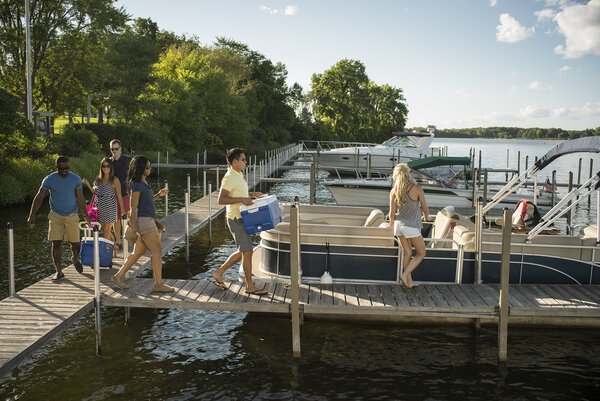
Boat Insurance Guide: Costs & Coverage
When it comes to insuring your boat, it’s often best to separate your boat insurance from your homeowner's policy. Many homeowners’ policies limit or don’t cover marine-specific risks, such as salvage work, wreck removal, pollution or environmental damage; but there are exceptions.
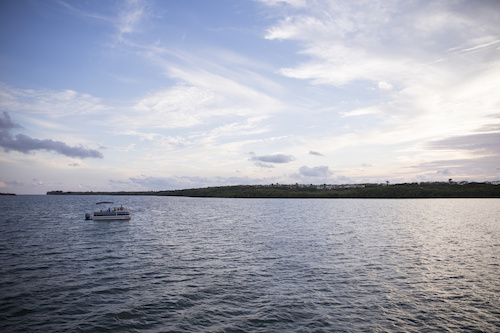
Types of Boat Insurance
- Boat Insurance Costs
- Boat Insurance FAQs
Insurance Factors
Insurers consider many factors when deciding whether or not to offer a policy. Almost any vessel can be insured— for a price. You want to consider the following to make sure the policy you purchase meets your needs:
- Age of Boat
- Speed/Horsepower
- Condition (Does it meet US Coast Guard Standards in effect at the time it was built?)
- Primary residence (If the boat is used as a primary residence)
- Type (Inboard, Outboard, utility, cruiser, bassboat, saltwater fishing boat, performance boat)
- Homemade (Boats without a serial number are tricky but many kits are okay)
- Houseboats with no motor
- Ownership (more than 2 owners)
- Where it will operate (Ocean, lakes, bays, rivers, Great Lakes)
There are two basic types of boat insurance— “agreed value” and “actual cash value.” How depreciation is handled is what sets them apart.
An "agreed value" policy covers the boat based on its value when the policy was written. While it can cost more up front, there is no depreciation for a total loss of the boat (some partial losses may be depreciated).
"Actual cash value" policies cost less up front, but factor in depreciation. In other word, the policy will only pay up to the actual cash value of the boat at the time it is declared a total or partial loss. Eventually, as your boat ages, your insurer will likely insist on an actual cash value policy—and if often gives a substantial savings.
Kinds of Boat Insurance Policies

- Personal Watercraft ( PWC )
- Yacht - generally, vessels 26' and smaller are called "boats,” and "yachts" are 27' and larger. Yacht coverage tends to be broader and more specialized because larger boats travel farther and have more unique exposures.
- Boat & PWC Rental - Although this is generally not required, rental insurance will help cover any damage the vessel, as well as the operator and passengers.
- Boat Clubs - covers all members of club while operating a boat.
- Professional (ProAngler, Fishing Guides & Charters) - These policies are very customizable and can cover items like travel to a tournament, equipment and more.
What Boat Insurance Policies Cover
How and where you boat determines the type of coverage you need. An "all risk" policy will offer the best protection. However, an “all risk” policy does not cover every type of loss. In insurance terms “all risk” just means that any risk not specifically omitted in the policy is covered. Typical exclusions include wear and tear, marring, denting, animal damage, manufacturers’ defects, design defects, ice and freezing.
You may also be able to add extra coverage. Available options may include: medical payments, personal effects, uninsured boaters liability, and towing and assistance. Most policies will cover permanently attached equipment, as well as items like anchors, oars, trolling motors, tools, seat cushions, and life jackets. Be sure to discuss these options with your agent.
Types of Boat Insurance Coverage
This will depend on the type of policy, but common coverage add-ons (in addition to basic ones above) include:
- Specialized Coverage: Coverage for something specific on your boat like an expensive prop or navigation equipment.
- Salvage: Coverage that pays to remove your boat due to damage, from substantial to minor.
- Consequential Damage: Covers a loss that was the result wear and tear rather than an accident (rot, mold, corrosion).
- Towing: Towing your boat across a body of water to safety can cost $400 per hour.
- Cruising Extension: You can get temporary, additional coverage if you plan on leaving the USA (typically to Mexico or the Bahamas).
Insurance Claims
Hopefully, you will never need to make a claim but if you do, it’s good to be prepared. You are not required to carry proof of insurance on your boat, but it’s a good idea keep claim information handy for an emergency. Ask how the claim process works when you’re shopping for policies. Naturally, it should be quick and easy. In addition, find out if your agent (or other representative) will be available if you need help dealing with the aftermath of a claim, such as arranging for towing or salvage, rather than just cutting a check and leaving.
Shopping for Boat Insurance
Start with a little fact-finding. Ask your boating friends which company they use and how their claims have been handled. The way an insurer has handled claims in the past is a good indicator of the quality of service you can expect in the future.
State insurance regulatory agencies are also a good reference and can be found online.
Boat Insurance Cost Factors
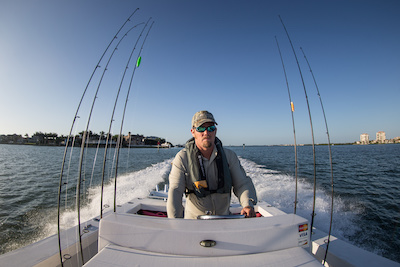
- Cruising Area: Where you boat.
- Boating Safety Education: If you have been formally trained or certified.
- Good Driving Records: Both boating and driving.
- Liability Limits: The higher the limit the higher the cost.
- Deductible: The higher the deductible the lower the premium.
- Towing insurance requirements for offshore fishing (for example, a 20-mile tow could cost $3,000).
If you boat in a hurricane zone, your insurer may expect you to provide a hurricane plan. If a storm approaches, will you have it stored in a hurricane-proof facility or will you tow it or skipper it to a safer harbor. The answer can affect your rates, even lower them, but be prepared to follow the plan, because your coverage may hinge on it.
Insurance Discounts
There are a few ways to reduce your boat insurance costs. For example, if your boating is restricted by seasons and your boat is in storage during the winter, you can get deductions for winter layup. Many insurers offer discounts for good driving records and for anyone who has completed boater education classes. Finally, it usually costs less to be insured in fresh water versus salt, so be sure to discuss where you boat with your agent. You may earn extra savings by bundling your coverage with the same company that insures your home and/or car.
Before you buy your new vessel, it’s a good idea to determine your insurance costs based on your needs.
Boat Insurance Coverage FAQs
Small Boat (29' or less) Insurance
What is the best coverage for my boat?
It is best to have what is known as an "All Risk" policy, which will provide coverage for all types of losses except those specifically excluded in the policy. Typical exclusions may include wear and tear, gradual deterioration, marring, denting, scratching, animal damage, manufacturer's defects, defects in design, and ice and freezing.
How much should I insure my boat for?
You should insure your boat for the amount it would cost you to replace it with like kind and quality. This is called "Agreed Value" or "Stated Value" coverage, and in the event of a total loss, will pay the full insured amount. Beware of policies providing "Actual Cash Value" (ACV) coverage, which means the value of your boat will be replacement cost less depreciation.
What other coverages can I expect with my policy?
The following are standard coverages with standard deductibles and average limits:
- Medical payments, $5,000
- $1,000 limit Personal effects, $250 deductible
- Uninsured boaters liability, between $300,000 and $500,000
- $500 to $1000 limit Towing and assistance, no deductible
- $1,000 limit Fishing equipment, $250 deductible
Who is allowed to operate my boat?
Most policies will allow anyone to operate your boat so long as you have given them permission. There are exceptions, of course, especially with high performance boats or personal watercraft so always read your policy. But beware, too many additional drivers often results in increased premiums.
I live in an area where I can't use my boat in the winter, but my lender requires it be insured year-round. What can I do?
Ask your insurance agent if they offer what is commonly referred to as a “lay-up” discount. You have year-round coverage with a discount for the months your boat is in dry storage.
Large Boat (Greater than 29') Insurance
What are the differences between boat and yacht insurance?
Generally "boats" are considered to be 26' and smaller, and "yachts" are 27' and larger. Generally speaking yacht coverage is broader and more specialized because larger boats travel further and have more unique exposures.
What should I look for in a yacht policy?
There are two main section s of a yacht policy. Hull insurance is all risk direct damage coverage that creates a very broad insuring agreement. It will include agreed amount hull coverage, meaning all parties agree at the time the policy is written on the value of the vessel and that value will be paid in the event of a total loss.
A true yacht policy also includes replacement cost (new for old) coverage on partial losses, with the exception of sails, canvas, batteries, outboards and sometimes outdrives, which are depreciated. Protection and indemnity insurance is the broadest of all liability coverages, and because maritime law is unique, you will need coverages that are designed for those exposures. Such things as Harborworkers and Longshoreman's coverage and Jones Act (crew) coverage can be critical, as an uncovered loss in this area could run into hundreds of thousands of dollars. Besides providing payment of judgments against you, P&I also provides for your defense in Admiralty Courts.
What is a normal deductible?
A yacht policy usually carries a percentage of the insured value deductible, for instance a 1%, deductible means a boat insured for $100,000 would have a $1,000 deductible. Most lenders allow a maximum deductible of 2% of the insured value. Beware of "named special deductibles" such as storm damage of 10% or more.
What are some of the other standard coverages I can expect?
These standard coverages have standard deductibles and average limits:
- Medical payments, $10,000 limit
- $5,000 limit personal effects, $250 deductible
- $500,000 limit uninsured boaters liability, no deductible
- $1,000 to $3,000 limit Towing and assistance, no deductible
- $1,000 Hurricane haul out coverage. Small percentage of limit as deductible. Hurricane warning must be posted by NOA. Payment made to move boat to safe location, haul out or make special preparations to withstand storm.
What is Breach of Warranty?
That is coverage that primarily protects the lienholder's interest in your boat, paying off the balance owed but nothing more. If you breach the warranties in the policy, such as promising not to go outside your navigational limits, not to use your boat during the lay-up period, not to use your boat for anything but private pleasure use, and you do NOT have this coverage and experience a loss, you don't get paid for that loss and neither does the lender. You could end up making payments on a boat you cannot use.
Editor's Note: Information Courtesy of National Marine Lenders Association .
Latest Wave of Boating News & Resources
Inspirational stories, how-to articles, and expert tips for new & experienced boaters
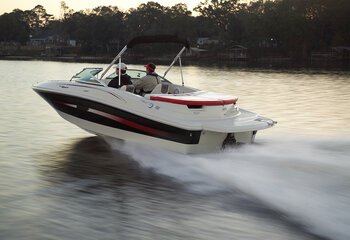
What is a Sterndrive, and is It Right for You?
Sterndrives, also known as inboard/outboard engines, are popular among boaters for their unique blend of power and versatility.

8 Waterfront Music Festivals You Can Get to By Boat
What is the only thing better than attending a multi-day music festival? Getting to experience it on the water! Instead of battling concert traffic, boaters have the unique luxury of attending various music and art festivals by boat.

8 Tips for Planning a Wedding on a Boat
Want to host your wedding on a boat? Not only are boats cost-effective venues, but they're a romantic, unique, and memorable way to tie the knot (pun intended).
Join Our Newsletter!
Get community news, buying bargains, and how-to guides at your fingertips.
Average Sailboat Insurance Cost in 2023 (13 Examples)
Are you in the market for sailboat insurance but unsure of how much it will cost? There are many factors that go into determining the cost of sailboat insurance, including the type of boat and its length. In this article, we will provide you with 13 examples of sailboat insurance costs in 2023 for different types of boats, such as catamarans and daysailers, and different boat lengths ranging from 20 to 50 feet.
On average, sailboat owners typically pay between $250 and $1,500 annually to insure their sailboats. However, the cost can be higher or lower, depending on the coverage options you choose. You can expect to pay up to $4,000 per year when insuring 50-foot sailboats and catamarans.
When it comes to sailboat insurance, many coverage options are available, such as basic coverage, comprehensive coverage, and specialized coverage. Let's find out what's included in each of these coverage options as we further dive into the article below.
- The average cost of insurance depends on the type of your sailboat, the length of your boat, your location, and the use or purpose of your boat.
- Boats with fuel tanks are required to have liability coverage in case of an oil spill or fuel spill. Meanwhile, boats with anchors and electronics are also required to have additional coverage and can increase your insurance premium, especially if they are expensive or if they increase the risk of theft or damage.
- A 50-foot catamaran has the highest insurance cost, averaging up to $4,000 per year.

On this page:
13 examples of sailboat insurance costs in 2023, factors affecting sailboat insurance costs, coverage options and their inclusions, insurance costs by boat use, how to reduce sailboat insurance costs.
Sailboat insurance is a type of boat insurance that provides coverage for your sailboat in case of damage or loss. It is an important investment for any boat owner, as it can provide coverage for a wide range of incidents, such as collision damage, bodily injury liability, property damage liability, and more.
Sailboat owners can expect to pay between $250 and $4,000 per year to insure their sailboats. The cost can be higher or lower depending on your coverage options.
Below is a table containing examples of sailboat insurance costs in 2023 to give you a better understanding of what to expect when shopping for sailboat insurance.
| $1,500 - $2,500 per year (up to $4,000 per year for larger boats) | |
| $250 - $500 per year (up to $1,000 per year for larger boats) | |
| $1,000 - $2,500 per year (up to $3,500 per year for larger boats) | |
| $250 - $1,500 per year (depending on policy type and coverage amounts) | |
| $500 - $2,500 per year (depending on the size and value of the boat) | |
| $250 - $1,500 per year (depending on modifications made) | |
| $250 - $1,500 per year (depending on the size and value of the boat) | |
| $250 - $1,500 per year (depending on the size and value of the boat) | |
| $100 - $500 per year (depending on performance and use) | |
| $250 - $1,500 per year (depending on the size and value of the boat) |
Insurance costs for catamaran
Catamarans are popular among sailors because they are stable and offer more space than traditional monohull sailboats. However, catamarans can be more expensive to insure due to their size and complexity . On average, you can expect to pay between $1,500 and $2,500 per year for catamaran insurance.
For a 40-foot catamaran, you can expect to pay up to $3,000 per year for the insurance, and larger catamarans cost even more to insure, with policies for 50-foot catamarans averaging around $4,000 per year.
Insurance costs for different sizes of catamarans can be found in this article: Average Cost of Buying & Owning a Catamaran (With 4 Examples)

Insurance costs for daysailers
Daysailers are small sailboats designed for day trips and recreational sailing. These boats are typically less expensive to insure than larger sailboats because they are less complex and have a lower risk of damage.
On average, you can expect to pay between $250 and $500 per year for daysailer insurance. For the insurance of a 20-foot daysailer, you might need to pay up to $750 per year. Policies for larger daysailers, such as a 30-footer, can cost around $1,000 per year.
Insurance costs for bluewater boats
Bluewater boats are designed for long-distance cruising and are built to withstand heavy seas and harsh weather conditions. Because of their specialized construction and equipment, bluewater boats can be costly to insure.
On average, you can expect to pay between $1,000 and $2,500 per year to insure a 40-foot bluewater boat. Policies for larger bluewater boats, such as a 50-footer, can cost around $3,500 per year.
Insurance costs for monohulls
Monohulls are the most common type of sailboat and are generally the least expensive to insure. The average cost of insurance for a monohull is between $250 and $1,500 per year, depending on factors such as policy type and coverage amounts.
If you have an older or less expensive monohull, you may be able to get away with only basic coverage, which can cost as little as $250 per year.
Insurance costs for a trimaran
Trimarans are a type of multihull sailboat that have three hulls. Because they are less common than monohulls, insurance costs for trimarans can be slightly higher.
The average cost of insurance for a trimaran is between $500 and $2,500 per year, depending on the size and value of the boat. If you have a larger or more expensive trimaran, you may need to purchase additional coverage, such as agreed-value coverage, which can increase your insurance costs.
Insurance cost for kelch
Kelch sailboats are a type of monohull sailboat that are known for their stability and speed. Insurance costs for Kelch sailboats are similar to those for other monohulls, with an average cost of between $250 and $1,500 per year. However, if you have made any modifications to your Kelch sailboat, such as adding a racing rig or a larger engine, your insurance costs may be higher.
Insurance cost for cutter
Cutter sailboats are a type of monohull sailboat that are known for their versatility and ability to handle a variety of weather conditions. Insurance costs for cutter sailboats are similar to those for other monohulls, with an average cost of between $250 and $1,500 per year . However, if you have a larger or more expensive cutter sailboat, you may need to purchase additional coverage, such as liability coverage, which can increase your insurance costs.
Insurance cost for a sloop
Sloop sailboats are a type of monohull sailboat that has a single mast and a fore-and-aft rig. Insurance costs for sloop sailboats are similar to those for other monohulls, with an average cost of between $250 and $1,500 per year. However, if you have a larger or more expensive sloop sailboat, you may need to purchase additional coverage, such as agreed-value coverage, which can increase your insurance costs.
Insurance cost for dinghy
Dinghies are small, lightweight sailboats that are typically used for racing or day sailing. Insurance costs for dinghies are generally lower than for other types of sailboats, with an average cost of between $100 and $500 per year. However, if you have a high-performance dinghy or if you use your dinghy for racing, your insurance costs may be higher.
Insurance cost for yawl
Yawl sailboats are a type of monohull sailboat that have two masts, with the aft mast shorter than the forward mast. Yawl sailboats can be insured at an average cost between $250 and $1,500 per year.
The length of your sailboat can also affect the cost of your insurance policy. Here are some examples of sailboat insurance costs for boats of different lengths:
| $250 - $500 per year | |
| $500 - $1,000 per year | |
| $1,500 - $2,500 per year |
Insurance costs for 20-feet boats
If you own a 20-foot sailboat, you can expect to pay an average of $250 to $500 per year for insurance. However, insurance costs may vary depending on the type of boat you own and the amount of coverage you need.
Insurance costs for 30-feet boats
For a 30-foot sailboat, you can expect to pay an average of $500 to $1,000 per year for insurance. Again, this cost can vary depending on the type of boat you own and the amount of coverage you need.
Insurance costs for 50-feet boats
For a 50-foot sailboat, you can expect to pay an average of $2,000 to $3,000 per year for insurance. This is the highest insurance cost range on our list, but it's not surprising given the size and value of these boats.
Insurance costs for new vs. used sailboats
Below is a table summarizing the estimated insurance costs of new and used sailboats based on age:
| Less than 1 year | $1,500 - $3,000 per year | |
| 1-5 years old | $1,000 - $2,500 per year | |
| 5-10 years old | $800 - $1,500 per year | |
| 10-20 years old | $500 - $1,000 per year | |
| Over 20 years old | $300 - $800 per year |
The actual insurance costs for both new and used sailboats can vary depending on various factors such as the type of boat, its age, location, usage, and the insurance company's policies.
In general, the insurance costs for a new sailboat are typically higher compared to a used sailboat. This is because new sailboats have a higher value and are more expensive to repair or replace in case of damage or loss. On the other hand, used sailboats have a lower value and may have pre-existing wear and tear, which can lower their insurance costs.

The length and type of sailboat can affect insurance costs
Generally, larger boats and more expensive boats will cost more to insure than smaller boats and less expensive boats. Additionally, different types of boats may have different insurance requirements and costs. For example, catamarans may require different coverage than a daysailer.
The age and condition of your sailboat can impact insurance costs
Older boats or boats in poor condition may be more expensive to insure due to the increased risk of damage or accidents.
The location of your sailboat has an effect on insurance costs
Where you keep your sailboat can also impact your insurance costs. Some areas may be considered higher risk due to weather patterns, theft rates, or other factors, which can result in higher insurance premiums.
Your driving record and experience can also impact insurance costs
If you have a history of accidents or violations, you may be considered a higher risk and may pay more for coverage. Additionally, more experienced sailors may be eligible for lower insurance rates.
Insurance costs can be affected by whether your sailboat is motor-operated or not
If your sailboat has a motor, it can also impact your insurance costs. Generally, sailboats with motors will cost more to insure than those without motors.
The insurance company you choose can impact sailboat insurance costs
The insurance company you choose can also impact your sailboat insurance costs. Different insurance companies may offer different rates, premiums, and discounts, so you may need to shop around and compare quotes before choosing a policy.
Completing safety courses and marine inspection can lower insurance costs
Completing safety courses or having your sailboat inspected by a marine surveyor can also impact your insurance costs. Some insurance companies may offer discounts for completing safety courses or having your boat inspected, as it can reduce the risk of accidents or damage.
Allowing underage operators can affect your insurance costs
If you plan to allow underage operators to drive your sailboat, it can impact your insurance costs. Some insurance companies may require additional coverage or charge higher premiums for underage operators.
Living aboard your sailboat will require additional insurance
If you plan to live aboard your sailboat , you may need to purchase additional coverage or a different type of policy. Liveaboard sailboat insurance can provide coverage for personal belongings, liability, and more, but it may be more expensive than standard sailboat insurance.

Basic coverage includes liability coverage and damages
Liability coverage protects you if you are found to be at fault for an accident on the water. Damages to your boat may be covered up to a certain amount, depending on your policy.
Comprehensive coverage includes a more extensive form of liability coverage
Comprehensive coverage is a more extensive form of coverage that includes liability coverage as well as coverage for damages to your boat. It may also include coverage for medical expenses and other related costs.
Salvage coverage includes the costs in case of a wreck
In the event of a wreck, salvage coverage can help cover the costs of removing your boat from the water. This can be an expensive process, so you may need to make sure you have adequate coverage.
Specialized coverage includes insurance for specific boat needs
If you have a specialized sailboat, such as a catamaran or a daysailer, you may need specialized coverage. This covers the specific needs of your boat like an expensive prop or navigation equipment. Make sure your policy includes coverage for your specific type of boat.
If you want to know more about boat insurance and what the best insurance should cover, read Boat Insurance Should Cover These 10 Basic Things
When it comes to sailboat insurance costs, the manner in which you use your boat can have a significant impact on the premium.
Boats used for a recreational purpose has a lower insurance
If you're using your sailboat for recreational purposes only, you can expect to pay lower insurance premiums than if you're using it for commercial purposes. Recreational use typically involves activities such as day sailing, cruising, and racing.
Insurance costs for recreational sailboats generally range from $250 to $1,500 per year, depending on factors such as boat length, type, and value.
Boats used in fishing require additional insurance for fishing gears
If you're using your sailboat for fishing, you may need additional coverage for fishing equipment and other gear. Some insurance policies may include coverage for fishing equipment, while others may require you to purchase a separate policy.
Insurance costs for sailboats used for fishing can vary widely depending on factors such as the type and value of the boat, the amount of fishing equipment you have, and the waters you fish in.
Boats with anchors and electronics will need additional insurance
Insurance costs can also be affected by the type of equipment you have on board your sailboat. Anchors, electronics, and other types of gear can increase your insurance premium, especially if they are expensive or if they increase the risk of theft or damage. Make sure to discuss the equipment you have on board with your insurance provider to ensure that you have the appropriate coverage.
Boats transported via trailer will be required an additional coverage
If you transport your sailboat using a trailer, you may need additional coverage for the trailer itself. Some insurance policies may include coverage for trailers, while others may require you to purchase a separate policy.
Insurance costs for trailers can vary widely depending on factors such as the type and value of the trailer, the distance you transport your sailboat, and the frequency of transport.
Boats with fuel tanks are required to have a liability coverage
If your sailboat has a fuel tank, you may be required to carry liability coverage for fuel spills. The cost of this coverage can vary widely depending on factors such as the size of your fuel tank, the type of fuel you use, and the waters you sail in.

Sailboat insurance can be costly, but there are ways to reduce your premiums and save money. Here are some tips to help you lower your sailboat insurance costs:
Shop around for the best deal
Don't settle for the first insurance company you come across. Get quotes from multiple providers and compare their rates and coverage options. You may be surprised at how much you can save by doing some research and shopping around.
Take advantage of discounts
Many insurance companies offer discounts for various reasons, such as completing a boating safety course, having a clean driving record, or bundling your boat insurance with other policies. Ask your insurance agent about any available discounts and take advantage of them.
Upgrade your boat's safety features
Installing safety equipment on your boat, such as fire extinguishers, smoke detectors, and GPS tracking systems, can help lower your insurance premiums. These safety features reduce the risk of accidents and make your boat less likely to be stolen.
Consider raising your deductible
A higher deductible means you'll pay more out of pocket if you have to file a claim, but it can also lower your monthly premiums. If you have a good safety record and don't anticipate needing to file a claim, raising your deductible can be a good way to save money.
Talk to your insurance agent
Your insurance agent can be a valuable resource for finding ways to save money on your sailboat insurance. They can help you understand your coverage options and recommend ways to reduce your premiums.
Check if your homeowner's insurance covers your boat
If you own a small sailboat, your homeowner's insurance may provide some coverage for it. This can be a cost-effective option if you only use your boat occasionally and don't need comprehensive coverage.
Leave a comment
You may also like, does boat insurance cover sinking.
Insuring your boat is daunting and expensive. There are several types of insurance and they always have conditions on you need to meet. But don't worry, with some …

Boat Insurance Should Cover These 10 Basic Things

COMMENTS
Boat insurance typically costs between $200 and $500 per year, according to Trusted Choice, an industry group for independent insurance agents. ... With the average boat insurance claim hovering ...
The average boat insurance cost is around $300 per year ($25 per month), but depending on the type of insurance prices can vary between $150 and $500 per year ($12,5 and $41,5 per month). Table of Contents. 15 Examples of Average Insurance Prices; Factors That Influence Boat Insurance Cost;
Average cost of boat insurance from Allstate is about $20 a month, according to Allstate. Bundle boat insurance with an Allstate homeowners policy and you qualify for up to a 20% discount.
The average cost of boat insurance is $200 to $500 a year—although for a really big or expensive boat (like a yacht or sailboat), insurance can cost around 1-5% of the boat's value. For example, you may pay about $2,500 a year to insure a $100,000 yacht. But just like other insurance rates vary, boat insurance costs change depending on ...
As a result, you can expect to pay higher boat insurance premiums for a more valuable boat. In Delaware, the cost to insure a boat worth less than $20,000 would be only $377 annually. In the same state, it would cost an average of $1,697 to insure a boat worth $75,000 and nearly $17,000 annually to insure a boat worth $750,000.
The typical cost of boat coverage is between $200 and $500 per year. However, insurance may cost between 1 and 5 percent of the boat's worth for a yacht or sailboat. For instance, you may spend around $2,500 annually to insure a boat worth $100,000.
In 2022, the average annual cost of a boat insurance policy at Progressive ranged from $255 in Minnesota to $753 in Florida. * Boat insurance rates are impacted by many factors including age, boat type, boating history, coverages, and location. 4 min to read Explore Progressive's editorial standards ...
A simple, liability-only boat insurance premium typically costs between $200 and $500 annually. When you start to cover your boat instead of just damage to others, the costs shift to falling between 1% and 5% of your boat's value. The exact numbers within this range are determined by examining the above factors and subtracting discounts the ...
Boat insurance costs vary and can run from $500 per year for smaller boats to thousands of dollars for large yachts. A rule of thumb is that annual premiums will total 1 to 3 percent of the value of the vessel. For example, a $50,000 boat will have annual premiums of $500 - $3,000 and a policy for a $200,000 boat will cost $3,000-$6,000 per year.
The Average Cost of Boat Insurance. Let's start by looking at the average cost of boat insurance, applied broadly. Progressive calculated average boat insurance premiums in the United States using data from 2020 and 2021 - which is still fairly accurate for getting an initial estimate.
No coverage for commercial use. $25,000 limit for no-fault medical payments. Specialty provider SkiSafe is one of the biggest personal watercraft insurers you've never heard of. The company ...
A yacht can range in price from $300,000 to several million dollars. Purchasing one is a big investment and having the ability to insure your investment can ease your mind if there's an accident or your yacht needs repairs or replacement. Insuring your yacht is also not just about the boat.
Often, you can expect the annual cost of your boat insurance to be about 1.5% of the value of your boat. For example: $20,000 boats cost about $300 annually to insure. $50,000 boats cost about $750 annually to insure. $100,000 boats cost about $1,500 annually to insure.
The general rule of thumb when it comes to calculating average boat insurance cost is that you'll pay about 1.5% of the value of your boat in annual rates. To insure a boat worth around $20,000, it would cost you only about $300 per year to have it fully insured. If you own a motorboat worth $100,000, you can expect to pay about $1,500 to ...
The average boat insurance cost generally falls between $200 to $500 a year, corresponding to approximately 1-5% of the boat's value. However, this is just a broad estimate. The actual cost can vary significantly based on various factors, including the size and value of the boat, as well as the boating experience of the owner. ...
The average cost of boat insurance ranges from about $200 to $500 per year.However, this figure is a rough estimate based on the most common types of boats. In reality, boat premiums can range ...
The average cost of boat insurance works out to between $200 and $500 per year. However, this figure is only an average, and the price you pay could be far more than that, especially if you have a longer or luxury model. Typically, the cost of your annual insurance premiums will equate to around 1% of the boat's total value.
Markel offers boat insurance starting at just $100 per year depending on what coverage you need. Whether you're a professional fisher or just enjoy fishing for fun, Markel offers lots of ...
A yacht policy usually carries a percentage of the insured value deductible, for instance a 1%, deductible means a boat insured for $100,000 would have a $1,000 deductible. Most lenders allow a maximum deductible of 2% of the insured value. Beware of "named special deductibles" such as storm damage of 10% or more.
On average, sailboat owners typically pay between $250 and $1,500 annually to insure their sailboats. However, the cost can be higher or lower, depending on the coverage options you choose. You can expect to pay up to $4,000 per year when insuring 50-foot sailboats and catamarans. When it comes to sailboat insurance, many coverage options are ...
The average boat insurance premium is about 1.5% of the boat's insured value according to ... Actual cash value policies pay for replacement cost minus depreciation if you have a claim, and are ...
If your boat causes injury to others or damage to other boats, docks, or structures, boat liability insurance can help you.1 Injury or damage can be due to direct contact with your vessel or situations caused by your vessel, like large wakes. Boat liability coverage may provide protection against lawsuits, including the payment of settlements and legal fees.